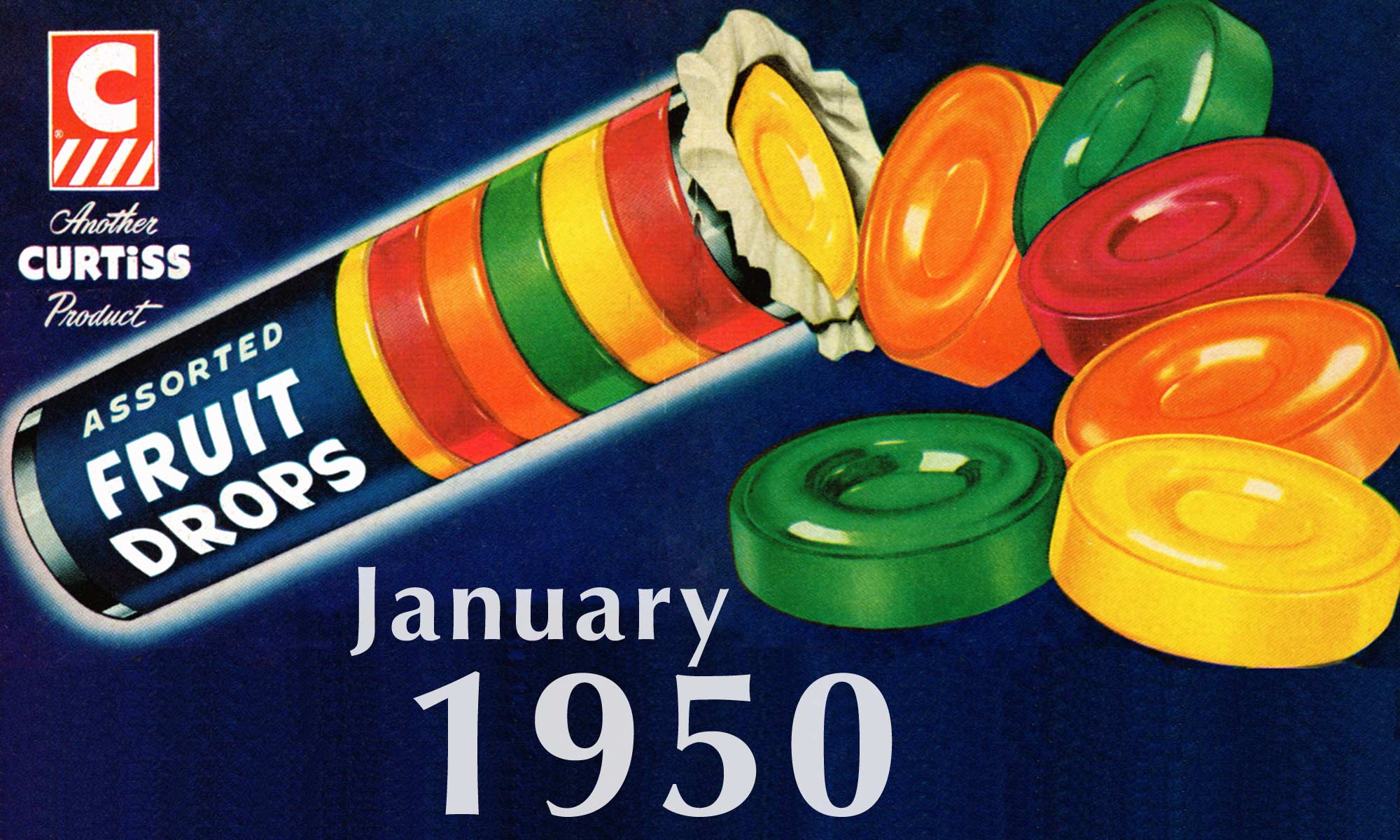| ◄ JANUARY ► | ||||||
|---|---|---|---|---|---|---|
| ◄ 1950 ► | ||||||
| 1 | 2 | 3 | 4 | 5 | 6 | 7 |
| 8 | 9 | 10 | 11 | 12 | 13 | 14 |
| 15 | 16 | 17 | 18 | 19 | 20 | 21 |
| 22 | 23 | 24 | 25 | 26 | 27 | 28 |
| 29 | 30 | 31 | ||||
| President: | Harry S. Truman (D) | |||
| Vice-President: | Alben W. Barkley (D) | |||
| House: | 263 (D) | 167 (R) | 2 (Other) | 3 (Vacant) |
| Southern states: | 103 (D) | 2 (R) | ||
| Senate: | 54 (D) | 42 (R) | ||
| Southern states: | 22 (D) | |||
| GDP growth: | 7.3 % | (Annual) | ||
| 3.0 % | (Quarterly) | |||
| Fed discount rate: | 1½ % | |||
| Inflation: | -2.1 % | |||
| Unemployment: | 6.5 % | |||
▲Sunday, January 1
New Year’s Day
▲Monday, January 2
▲Tuesday, January 3
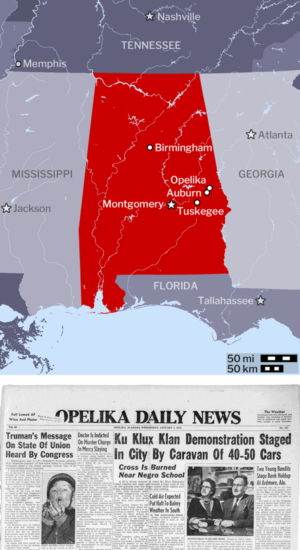 Jan 3: KKK parades, burn cross at Opelika, Alabama. The Ku Klux Klan parade is made up of forty to fifty cars working their way through the mostly African-American south side neighborhoods. After slowly cruising through several streets, the Klan burns a cross at the old fairgrounds near the East Street Negro School where adult night classes are taking place. The parade then continues along East Street to the cemetery where the group disbands. Police Chief Clanton Chandler at first says that he issued a permit, but he later denies doing so, saying he only gave “oral permission.” Witnesses say they see several police officers stationed at key intersections to block traffic while the parade goes by. None of the Klansmen are masked, in compliance with a new state law banning face coverings in public. The law was passed following a wave of Klan violence last year. Over the next several days, the demonstration will draw sharp protests from eight local church leaders, the Kiwanis, and other civic groups and social clubs, but 136 residents will sign their names to a petition in support of the Klan.
Jan 3: KKK parades, burn cross at Opelika, Alabama. The Ku Klux Klan parade is made up of forty to fifty cars working their way through the mostly African-American south side neighborhoods. After slowly cruising through several streets, the Klan burns a cross at the old fairgrounds near the East Street Negro School where adult night classes are taking place. The parade then continues along East Street to the cemetery where the group disbands. Police Chief Clanton Chandler at first says that he issued a permit, but he later denies doing so, saying he only gave “oral permission.” Witnesses say they see several police officers stationed at key intersections to block traffic while the parade goes by. None of the Klansmen are masked, in compliance with a new state law banning face coverings in public. The law was passed following a wave of Klan violence last year. Over the next several days, the demonstration will draw sharp protests from eight local church leaders, the Kiwanis, and other civic groups and social clubs, but 136 residents will sign their names to a petition in support of the Klan.▲Wednesday, January 4
![]()
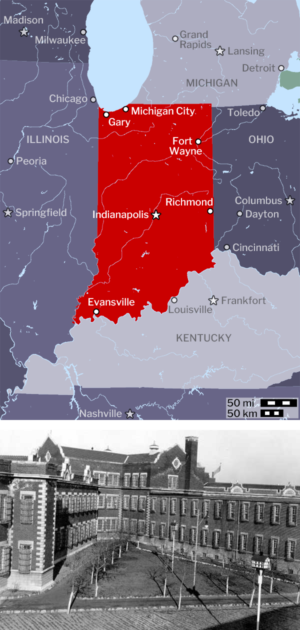 Jan 4: Indiana’s Sexual Psychopath law ensnares a gay man. This story, at least as it is described by the Palladium-Item of Richmond, Indiana, is every gay man’s worst nightmare. Police arrested John Catron in November and charged him with vagrancy “after he admitted homosexual activities with two other men.” The news reports do not indicate how this conversation came about, but it appears that the “homosexual activities” were entirely consensual. The previous March, Indiana enacted a psychopathic offender law that allows anyone with “criminal propensities to the commission of sex offenses” to be put away indefinitely in a state mental hospital until he is “fully recovered,” which could be for life. Prosecutor William H. Reller is itching to use this law. He upgrades the charge from vagrancy to sodomy, so that the case will qualify for disposition under the sexual psychopath law. After two physicians examine Catron, Judge G.H. Hoelscher declares him a criminal sexual psychopathic person and turns him over to the custody of the Indiana Hospital for Insane Criminals on the grounds of the Indiana State Prison in Michigan City.
Jan 4: Indiana’s Sexual Psychopath law ensnares a gay man. This story, at least as it is described by the Palladium-Item of Richmond, Indiana, is every gay man’s worst nightmare. Police arrested John Catron in November and charged him with vagrancy “after he admitted homosexual activities with two other men.” The news reports do not indicate how this conversation came about, but it appears that the “homosexual activities” were entirely consensual. The previous March, Indiana enacted a psychopathic offender law that allows anyone with “criminal propensities to the commission of sex offenses” to be put away indefinitely in a state mental hospital until he is “fully recovered,” which could be for life. Prosecutor William H. Reller is itching to use this law. He upgrades the charge from vagrancy to sodomy, so that the case will qualify for disposition under the sexual psychopath law. After two physicians examine Catron, Judge G.H. Hoelscher declares him a criminal sexual psychopathic person and turns him over to the custody of the Indiana Hospital for Insane Criminals on the grounds of the Indiana State Prison in Michigan City.
![]() Jan 4: The New York Sun publishes its last edition. The conservative Sun was bought by the rival evening paper, the liberal New York World-Telegram, the day before. Many of the Sun’s more popular columnists and features will move to the World-Telegram, but most other Sun employees will be laid off. The Sun’s closure leaves New York City with three city-wide afternoon and evening newspapers: The World-Telegram, The New York Post, and The New York Journal-American.
Jan 4: The New York Sun publishes its last edition. The conservative Sun was bought by the rival evening paper, the liberal New York World-Telegram, the day before. Many of the Sun’s more popular columnists and features will move to the World-Telegram, but most other Sun employees will be laid off. The Sun’s closure leaves New York City with three city-wide afternoon and evening newspapers: The World-Telegram, The New York Post, and The New York Journal-American.
![]() Jan 4: Coal strike brings cuts to train service. To help alleviate coal shortages brought on by a work slowdown by the United Mine Workers, the Interstate Commerce Commission orders railroads with short coal supplies to cut coal-burning passenger service by one-third beginning at midnight Sunday. The order will result in the cancellation of about 600 coal-burning passenger trains. Railroads consume about 16% of all coal production. Many communities in the Northeast have imposed coal rationing for home heating, although a mild winter has helped to preserve stockpiles. UMW workers have been working on a three-day-a-week schedule in a partial strike action since December 1. Miners have been striking off and on since last June when the UMW’s contract with coal operators expired.
Jan 4: Coal strike brings cuts to train service. To help alleviate coal shortages brought on by a work slowdown by the United Mine Workers, the Interstate Commerce Commission orders railroads with short coal supplies to cut coal-burning passenger service by one-third beginning at midnight Sunday. The order will result in the cancellation of about 600 coal-burning passenger trains. Railroads consume about 16% of all coal production. Many communities in the Northeast have imposed coal rationing for home heating, although a mild winter has helped to preserve stockpiles. UMW workers have been working on a three-day-a-week schedule in a partial strike action since December 1. Miners have been striking off and on since last June when the UMW’s contract with coal operators expired.
▲Thursday, January 5
![]() Jan 5: Truman: U.S. will not intervene in Taiwan. President Truman sets forth U.S. policy on the question of American military protection for Taiwan, one of the last bastions of the Republic of China’s nationalist government under Chang Kai-skek. Truman says that the U.S. will not intervene to protect Taiwan or other Nationalist-held islands. “The United States has no predatory designs on Formosa or on any other Chinese territory,” says Truman. “The United States has no desire to obtain special rights or privileges or to establish military bases on Formosa at this time. Nor does it have any intention of utilizing its armed force to interfere in the present situation.” He calls the war between the Nationalists and the Communists, who proclaimed the People’s Republic of China on the mainland last year, “the civil conflict in China,” He points out that this policy is in line with traditional U.S. policy in China, recent United nations resolutions against outside interference, and the Cairo and Potsdam agreements of 1943 and 1945. The announcement draws sharp reactions from Congress, where pressure has been building for deploying the U.S. military for Taiwan’s defense. Republican floor leader Sen. Kenneth Wherry (R-NE) says Truman has issued “an invitation to the Moscow-directed Communists to come and get it.” To these criticisms, Sen. Tom Connally (D-TX), shouted “Of course we are against Communism! We are all against Communism! But you who complain so bitterly about ‘inaction’ should now tell us precisely what you want to do. Do you want to send our troops into a Chinese civil war?”
Jan 5: Truman: U.S. will not intervene in Taiwan. President Truman sets forth U.S. policy on the question of American military protection for Taiwan, one of the last bastions of the Republic of China’s nationalist government under Chang Kai-skek. Truman says that the U.S. will not intervene to protect Taiwan or other Nationalist-held islands. “The United States has no predatory designs on Formosa or on any other Chinese territory,” says Truman. “The United States has no desire to obtain special rights or privileges or to establish military bases on Formosa at this time. Nor does it have any intention of utilizing its armed force to interfere in the present situation.” He calls the war between the Nationalists and the Communists, who proclaimed the People’s Republic of China on the mainland last year, “the civil conflict in China,” He points out that this policy is in line with traditional U.S. policy in China, recent United nations resolutions against outside interference, and the Cairo and Potsdam agreements of 1943 and 1945. The announcement draws sharp reactions from Congress, where pressure has been building for deploying the U.S. military for Taiwan’s defense. Republican floor leader Sen. Kenneth Wherry (R-NE) says Truman has issued “an invitation to the Moscow-directed Communists to come and get it.” To these criticisms, Sen. Tom Connally (D-TX), shouted “Of course we are against Communism! We are all against Communism! But you who complain so bitterly about ‘inaction’ should now tell us precisely what you want to do. Do you want to send our troops into a Chinese civil war?”
![]() Jan 5: Britain breaks relations with Nationalist China. In a move that has been expected for several weeks, Britain breaks off diplomatic relations with Chiang Kai-shek’s Nationalist government in Taiwan. It is now expected that Britain will likely seek some level of diplomatic relations with the mainland Communists. Says C.P. Mayhew, Parliamentary Under-Secretary for Foreign Affairs, “If we recognize the Chinese Communist Government, this will be because it has become the effective government of China and not because we like its policies and practices. It will be an acknowledgement of fact, not a mark of approbation.”
Jan 5: Britain breaks relations with Nationalist China. In a move that has been expected for several weeks, Britain breaks off diplomatic relations with Chiang Kai-shek’s Nationalist government in Taiwan. It is now expected that Britain will likely seek some level of diplomatic relations with the mainland Communists. Says C.P. Mayhew, Parliamentary Under-Secretary for Foreign Affairs, “If we recognize the Chinese Communist Government, this will be because it has become the effective government of China and not because we like its policies and practices. It will be an acknowledgement of fact, not a mark of approbation.”
![]()
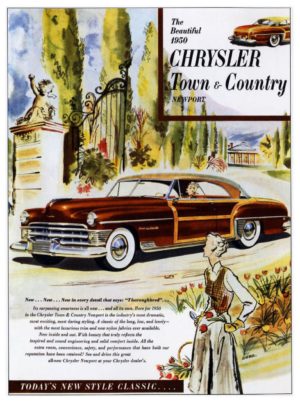 Jan 5: Chrysler dealers show off new 1950 models. Changes are modest from mid-1949, when the entire line switched from revived pre-war designs to all new styles. There are six models: the Royal and Windsor with six cylinder engines, and the Saratoga, New Yorker, Town and Country, and Crown Imperial, all with inline eights. All new this year are the “hardtop” Newports, available in the Windsor, New Yorker and Town and Country lines. As Chrysler explains it, ,”This car is designed for those who want the sleek, racy lines and unrestricted visibility and ventilation of a convertible, with the added safety provided by a solid steel top. This new Chrysler offering is in effect a hard-top convertible in appearance. It can be be opened up to the same degree as a convertible by dropping all of the side windows flush with the top of the body, while a huge rear window, with its sides curving into the steel roof, interferes virtually not at all with the illusion of a completely open car.” The Town and Country line this year is only available as a Newport. “With an all-steel body set off by artistic white ash trim and a solid steel top complementing its graceful lines, it promises to be extremely popular with those who are anxious to possess the upmost in moto-car swank.” Pricing isn’t announced for the Newport versions yet, and production will be interrupted by a costly three month strike later this month.
Jan 5: Chrysler dealers show off new 1950 models. Changes are modest from mid-1949, when the entire line switched from revived pre-war designs to all new styles. There are six models: the Royal and Windsor with six cylinder engines, and the Saratoga, New Yorker, Town and Country, and Crown Imperial, all with inline eights. All new this year are the “hardtop” Newports, available in the Windsor, New Yorker and Town and Country lines. As Chrysler explains it, ,”This car is designed for those who want the sleek, racy lines and unrestricted visibility and ventilation of a convertible, with the added safety provided by a solid steel top. This new Chrysler offering is in effect a hard-top convertible in appearance. It can be be opened up to the same degree as a convertible by dropping all of the side windows flush with the top of the body, while a huge rear window, with its sides curving into the steel roof, interferes virtually not at all with the illusion of a completely open car.” The Town and Country line this year is only available as a Newport. “With an all-steel body set off by artistic white ash trim and a solid steel top complementing its graceful lines, it promises to be extremely popular with those who are anxious to possess the upmost in moto-car swank.” Pricing isn’t announced for the Newport versions yet, and production will be interrupted by a costly three month strike later this month.
▲Friday, January 6
Epiphany
![]()
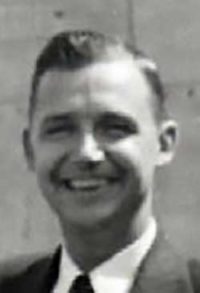 Jan 6: Congressman proposes federalizing sex crime laws. Rep. Frank L. Chelf (D-KY) responds to the national sex crime panic with a proposal to amend the Fugitive Felon Act to allow federal prosecution of sexual crimes committed against minors if the alleged perpetrators cross state lines while escaping capture. Under his proposal, these individuals would be subject to imprisonment for ten to twenty years. Chelf says he originally favored a law extending federal jurisdiction over all sex crimes, but found that the Constitution prohibits him from doing so. “A sure-fire, certain and strict law wold be the greatest deterrent to prospective sex criminals,” he says. The law currently allows for federal prosecution for those crossing state lines to avoid prosecution for murder, kidnaping, burglary, robbery, rape, assault, extortion or “mayhem,” but the current law only allows for imprisonment of up to five years. Federal prosecution would be in addition to any prosecutions pursued in the state where the crime occurred. Under current practices, the Fugitive Felon Act has been used mainly to streamline the extradition process and authorize federal authorities to locate and capture fleeing suspects. Congress will decline to act on Chelf’s amendment.
Jan 6: Congressman proposes federalizing sex crime laws. Rep. Frank L. Chelf (D-KY) responds to the national sex crime panic with a proposal to amend the Fugitive Felon Act to allow federal prosecution of sexual crimes committed against minors if the alleged perpetrators cross state lines while escaping capture. Under his proposal, these individuals would be subject to imprisonment for ten to twenty years. Chelf says he originally favored a law extending federal jurisdiction over all sex crimes, but found that the Constitution prohibits him from doing so. “A sure-fire, certain and strict law wold be the greatest deterrent to prospective sex criminals,” he says. The law currently allows for federal prosecution for those crossing state lines to avoid prosecution for murder, kidnaping, burglary, robbery, rape, assault, extortion or “mayhem,” but the current law only allows for imprisonment of up to five years. Federal prosecution would be in addition to any prosecutions pursued in the state where the crime occurred. Under current practices, the Fugitive Felon Act has been used mainly to streamline the extradition process and authorize federal authorities to locate and capture fleeing suspects. Congress will decline to act on Chelf’s amendment.
![]() Jan 6: Britain, Norway, Denmark and Ceylon extend recognition to Communist China. As expected, the United Kingdom extends de jure recognition to the People’s Republic of China. The Foreign Office emphasizes that recognition doesn’t signify approval of the Communist regime, but merely faces the reality that the government of Mao Tse-tung (Mao Zedong) now controls most of China and is able to fulfill its international obligations. Norway, Denmark and Ceylon quickly follow suit.
Jan 6: Britain, Norway, Denmark and Ceylon extend recognition to Communist China. As expected, the United Kingdom extends de jure recognition to the People’s Republic of China. The Foreign Office emphasizes that recognition doesn’t signify approval of the Communist regime, but merely faces the reality that the government of Mao Tse-tung (Mao Zedong) now controls most of China and is able to fulfill its international obligations. Norway, Denmark and Ceylon quickly follow suit.
▲Saturday, January 7
![]()
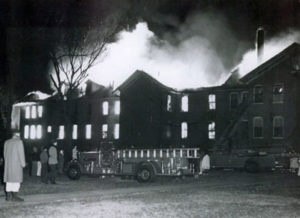 Jan 7: Hospital fire kills 40 patients in psychiatric ward. A fire at the women’s psychiatric ward at Mercy Hospital in Davenport, Iowa, kills forty patients who are locked inside and unable to escape. Police and fire fighters rescue twenty-five women from their rooms after removing the iron bars from their windows.
Jan 7: Hospital fire kills 40 patients in psychiatric ward. A fire at the women’s psychiatric ward at Mercy Hospital in Davenport, Iowa, kills forty patients who are locked inside and unable to escape. Police and fire fighters rescue twenty-five women from their rooms after removing the iron bars from their windows.
![]()
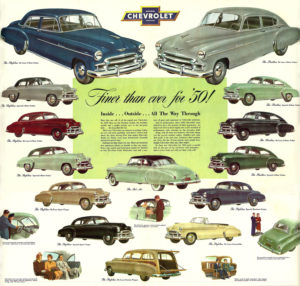 Jan 7: Chevy dealers display new “hardtop” Bel Airs. The new model appears in dealer showrooms, along with the rest of the Chevrolet line for 1950. Automakers are rushing to release “hardtops,” a popular style that looks like a low, sleek convertible at first glance — with a large wrap-around rear window, and side windows that completely roll down out of sight, leaving a large opening without the “B” pillar found in sedans and coupes. It has the beauty and sportiness of a convertible, but with all of the practical convenience and lower cost of a solid steel roof. The Bel Air, part of the Styleline series, joins thirteen other body styles in the Fleetline and Styleline ranges. All are powered by a six-cylinder engine delivering 105 horsepower. A new option for the Deluxe trim lines is G.M’s Powerlide transmission, available for $150 (about $1,650 today). Prices start at 1,446 ($15,800 today) for a Styleline Special two-door business coup, and top out at $2,130 ($23,300 today) for an “all-steel” station wagon. The Styleline Bel Air hardtop goes for $1,841 ($20,100 today).
Jan 7: Chevy dealers display new “hardtop” Bel Airs. The new model appears in dealer showrooms, along with the rest of the Chevrolet line for 1950. Automakers are rushing to release “hardtops,” a popular style that looks like a low, sleek convertible at first glance — with a large wrap-around rear window, and side windows that completely roll down out of sight, leaving a large opening without the “B” pillar found in sedans and coupes. It has the beauty and sportiness of a convertible, but with all of the practical convenience and lower cost of a solid steel roof. The Bel Air, part of the Styleline series, joins thirteen other body styles in the Fleetline and Styleline ranges. All are powered by a six-cylinder engine delivering 105 horsepower. A new option for the Deluxe trim lines is G.M’s Powerlide transmission, available for $150 (about $1,650 today). Prices start at 1,446 ($15,800 today) for a Styleline Special two-door business coup, and top out at $2,130 ($23,300 today) for an “all-steel” station wagon. The Styleline Bel Air hardtop goes for $1,841 ($20,100 today).
▲Sunday, January 8
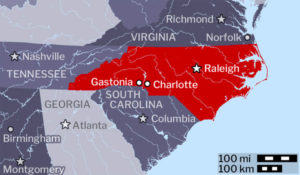 Jan 8: Klan rally in Gastonia, North Carolina draws 200. The featured speaker is Imperial Wizard Samuel W. Roper. He heads what he calls “the original Klan”, the Association of Georgia Klans. At its peak in 1949, the organization boasted local klaverns throughout the South and reached as far north as Ohio and Indiana. But since the death of Roper’s predecessor, Samuel Green, the group has been fragmenting into competing organizations. Roper devotes much of his speech to denouncing the splinter groups. Many of the attendees are leaders of local Klan groups in western North Carolina. The public meeting is held in a garage owned by Tommy Panther, head of the Gastonia Klavern. Roper and Panther announce a major campaign to organize klaverns in every incorporated community in the Carolinas and Virginia. Newspapers carry an Associated Press report of the meeting the next day, but the local Gastonia Gazette maintains complete silence.
Jan 8: Klan rally in Gastonia, North Carolina draws 200. The featured speaker is Imperial Wizard Samuel W. Roper. He heads what he calls “the original Klan”, the Association of Georgia Klans. At its peak in 1949, the organization boasted local klaverns throughout the South and reached as far north as Ohio and Indiana. But since the death of Roper’s predecessor, Samuel Green, the group has been fragmenting into competing organizations. Roper devotes much of his speech to denouncing the splinter groups. Many of the attendees are leaders of local Klan groups in western North Carolina. The public meeting is held in a garage owned by Tommy Panther, head of the Gastonia Klavern. Roper and Panther announce a major campaign to organize klaverns in every incorporated community in the Carolinas and Virginia. Newspapers carry an Associated Press report of the meeting the next day, but the local Gastonia Gazette maintains complete silence.▲Monday, January 9
![]() Jan 9: Wildcat coal strike hits steel company-owned mines. Coal miners begin a full-scale wildcat strike against so-called “captive mines” — mines operated by subsidiaries of major steel companies whose entire output goes directly to steel mills. About 70,000 miners walk off the job at mines operated by U.S. Steel, Carnegie-Illinois, Jones and Laughlin, Weirton, Republic, and Youngstown Sheet and Tube. Youngstown will be forced to cut steel production on Wednesday. United Mine Workers leaders deny making an official strike call, and say the wildcat strikes are beyond their control. But operators accuse the union of following a “checkerboard” pattern to harass mine owners by instigating walkouts in a different sector of the coal industry each week. Nearly 50,000 miners in six states have walked off the job. Miners have been working on a three-day-a-week schedule since December 1 in lieu of a full strike.
Jan 9: Wildcat coal strike hits steel company-owned mines. Coal miners begin a full-scale wildcat strike against so-called “captive mines” — mines operated by subsidiaries of major steel companies whose entire output goes directly to steel mills. About 70,000 miners walk off the job at mines operated by U.S. Steel, Carnegie-Illinois, Jones and Laughlin, Weirton, Republic, and Youngstown Sheet and Tube. Youngstown will be forced to cut steel production on Wednesday. United Mine Workers leaders deny making an official strike call, and say the wildcat strikes are beyond their control. But operators accuse the union of following a “checkerboard” pattern to harass mine owners by instigating walkouts in a different sector of the coal industry each week. Nearly 50,000 miners in six states have walked off the job. Miners have been working on a three-day-a-week schedule since December 1 in lieu of a full strike.
▲Tuesday, January 10
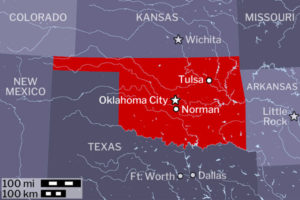 Jan 10: Cross burned on Oklahoma U. campus. A large cross is burned outside of the University of Oklahoma’s Hillel Foundation Hall where a civil rights meeting is taking place. The cross-burning group taunts the meeting attendees as “nigger lovers” and dares them to come outside. One of the first to leave the meeting is a reporter covering the meeting. The mob thinks he’s a committee member and attacks him, breaking his eyeglasses. The crowd moves back across the street when the fire department arrives to extinguish the cross. University president George Cross orders an investigation and vows to expel any student “hoodlums” who took part in the mob.
Jan 10: Cross burned on Oklahoma U. campus. A large cross is burned outside of the University of Oklahoma’s Hillel Foundation Hall where a civil rights meeting is taking place. The cross-burning group taunts the meeting attendees as “nigger lovers” and dares them to come outside. One of the first to leave the meeting is a reporter covering the meeting. The mob thinks he’s a committee member and attacks him, breaking his eyeglasses. The crowd moves back across the street when the fire department arrives to extinguish the cross. University president George Cross orders an investigation and vows to expel any student “hoodlums” who took part in the mob.![]()
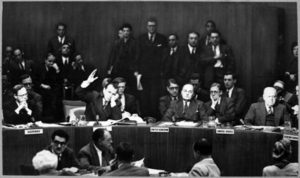 Jan 10: Soviets boycott U.N. Security Council over Chinese representation. Yakov Malik, the Soviet Ambassador to the United Nations, leads an angry walkout from the Security Council after it votes 8-2 against replacing the Nationalist Chinese delegation with one representing the Communist regime. Despite only controlling the island of Taiwan, the Nationalist delegation will continue to represent all of China in the Security Council and exercise its veto. Three days later, Malik will vow not to participate in the Security Council as long as the Nationalist representative sits at the table.
Jan 10: Soviets boycott U.N. Security Council over Chinese representation. Yakov Malik, the Soviet Ambassador to the United Nations, leads an angry walkout from the Security Council after it votes 8-2 against replacing the Nationalist Chinese delegation with one representing the Communist regime. Despite only controlling the island of Taiwan, the Nationalist delegation will continue to represent all of China in the Security Council and exercise its veto. Three days later, Malik will vow not to participate in the Security Council as long as the Nationalist representative sits at the table.
![]()
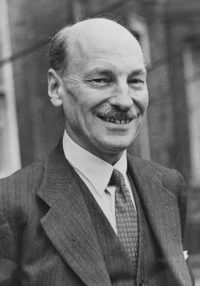 Jan 10: Britain’s Labour government sets date for general elections. British Prime Minister Clement Attlee has set the date for general elections to take place on February 23 at the completion of a full five-year term of government. The Labour government has enjoyed a 146-seat lead in Commons following the electoral landslide of 1945 that ended Winston Churchill’s wartime government. That dominance in Parliament has allowed the government to carry out its mandate to establish the National Health Service and nationalize basic industries and public utilities such as civil aviation, coal mining, the railways, public utilities, and the steel industry. Through it all, unemployment and inflation has remained low, while wages and working conditions have improved drastically. Mine safety improvements and a five-day work week are particularly notable accomplishments. But housing shortages, continued post-war rationing, and a drastic 30% devaluation of the Pound Sterling in September have taken their toll on the electorate.
Jan 10: Britain’s Labour government sets date for general elections. British Prime Minister Clement Attlee has set the date for general elections to take place on February 23 at the completion of a full five-year term of government. The Labour government has enjoyed a 146-seat lead in Commons following the electoral landslide of 1945 that ended Winston Churchill’s wartime government. That dominance in Parliament has allowed the government to carry out its mandate to establish the National Health Service and nationalize basic industries and public utilities such as civil aviation, coal mining, the railways, public utilities, and the steel industry. Through it all, unemployment and inflation has remained low, while wages and working conditions have improved drastically. Mine safety improvements and a five-day work week are particularly notable accomplishments. But housing shortages, continued post-war rationing, and a drastic 30% devaluation of the Pound Sterling in September have taken their toll on the electorate.
![]() Jan 10: C&O Railroad cuts food services due to coal strike. The Chesapeake and Ohio Railroad, which has already cut steam passenger service by a third due to coal shortages, says it will pull its dining, lounge and tavern cars from service. The company says it takes 18.8 pounds of coal to pull each car one mile.
Jan 10: C&O Railroad cuts food services due to coal strike. The Chesapeake and Ohio Railroad, which has already cut steam passenger service by a third due to coal shortages, says it will pull its dining, lounge and tavern cars from service. The company says it takes 18.8 pounds of coal to pull each car one mile.
![]()
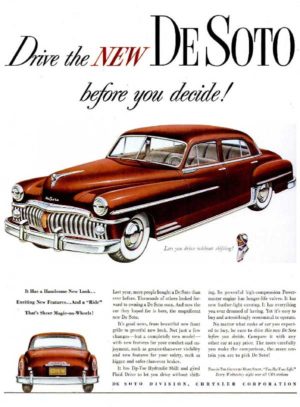 Jan 10: DeSoto dealers display new 1950 models. The DeSoto division of Chrysler Corporation reveals eleven body styles for 1950 in its Deluxe and Custom series. Styling is only slightly refreshed from last year’s complete re-design, which finally replaced DeSoto’s prewar body stytles. Tip-Toe hydraulic shift and fluid drive transmissions are a $120 (about $1,300 today) option for the four Deluxe models, but comes standard in the six Custom models. Other standard features for the Custom models include two-speed electric windshield wipers, a trunk light and full carpeting. Prices start at $2,260 ($24,700 today) for a four-door Deluxe. Custom models include a convertible for $2,730 ($29,800 today), an eight-passenger sedan for $3,015 ($33,000 today), a station wagon for $3,367 ($36,800 today), and a long-wheelbase nine-passenger Suburban for $3,470 ($37,900 today). A Sportsman “hardtop” — a style that looks like a convertible but features an all-steel roof — is scheduled for production, but its price hasn’t been announced yet.
Jan 10: DeSoto dealers display new 1950 models. The DeSoto division of Chrysler Corporation reveals eleven body styles for 1950 in its Deluxe and Custom series. Styling is only slightly refreshed from last year’s complete re-design, which finally replaced DeSoto’s prewar body stytles. Tip-Toe hydraulic shift and fluid drive transmissions are a $120 (about $1,300 today) option for the four Deluxe models, but comes standard in the six Custom models. Other standard features for the Custom models include two-speed electric windshield wipers, a trunk light and full carpeting. Prices start at $2,260 ($24,700 today) for a four-door Deluxe. Custom models include a convertible for $2,730 ($29,800 today), an eight-passenger sedan for $3,015 ($33,000 today), a station wagon for $3,367 ($36,800 today), and a long-wheelbase nine-passenger Suburban for $3,470 ($37,900 today). A Sportsman “hardtop” — a style that looks like a convertible but features an all-steel roof — is scheduled for production, but its price hasn’t been announced yet.
▲Wednesday, January 11
![]() Jan 11: UMW president calls for coal miners to resume half-schedule on Monday. United Mine Workers president John L. Lewis urges the 70,000 striking miners employed by “captive” coal mining subsidiaries of major steel mills to resume their three-day-a-week slowdown schedule next Monday. Those miners had walked off the jobs entirely last Monday. They will resume working the shortened work schedule that has been in place since December 1. The UMW has imposed the shortened schedule in lieu of a full work stoppage during the winter when demand for coal is at its highest. The UMW has been on strike off and on since last June when the UMW’s contract with coal operators expired.
Jan 11: UMW president calls for coal miners to resume half-schedule on Monday. United Mine Workers president John L. Lewis urges the 70,000 striking miners employed by “captive” coal mining subsidiaries of major steel mills to resume their three-day-a-week slowdown schedule next Monday. Those miners had walked off the jobs entirely last Monday. They will resume working the shortened work schedule that has been in place since December 1. The UMW has imposed the shortened schedule in lieu of a full work stoppage during the winter when demand for coal is at its highest. The UMW has been on strike off and on since last June when the UMW’s contract with coal operators expired.
▲Thursday, January 12
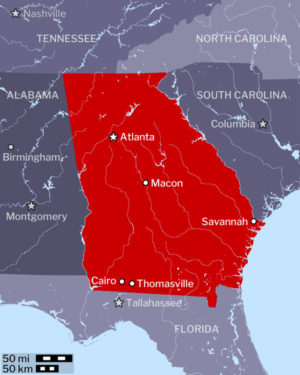 Jan 12: White preacher beaten by masked nightriders. Rev. Michael Picardi, an Italian-born Pentecostal preacher from Columbus, Ohio, is abducted and beaten by masked men near Cairo, GA. Picardi is in southern Georgia to lead a revival at a Negro church. He had been staying with an African-American family when Sheriff C.N. Strickland paid a call. The Sheriff told Picardi that staying with a black family “is not customary down here” and warned him to move out. Later that night, five masked men interrupt the revival service, bundle him into the car, and beat him savagely as they bounce along the county’s dirt roads. At one point, they pull over, order him out of the car, remove his shirt, and they flog him with a metal-tipped belt. They eventually return him to the church where his car is parked and tell him, “Get out of town; you’ve got 30 minutes.” The beaten and bloodied preacher drives to Thomasville and takes a bus to Atlanta where he contacts the authorities. Sheriff Strickland denies knowing anything about the beating.
Jan 12: White preacher beaten by masked nightriders. Rev. Michael Picardi, an Italian-born Pentecostal preacher from Columbus, Ohio, is abducted and beaten by masked men near Cairo, GA. Picardi is in southern Georgia to lead a revival at a Negro church. He had been staying with an African-American family when Sheriff C.N. Strickland paid a call. The Sheriff told Picardi that staying with a black family “is not customary down here” and warned him to move out. Later that night, five masked men interrupt the revival service, bundle him into the car, and beat him savagely as they bounce along the county’s dirt roads. At one point, they pull over, order him out of the car, remove his shirt, and they flog him with a metal-tipped belt. They eventually return him to the church where his car is parked and tell him, “Get out of town; you’ve got 30 minutes.” The beaten and bloodied preacher drives to Thomasville and takes a bus to Atlanta where he contacts the authorities. Sheriff Strickland denies knowing anything about the beating.![]()
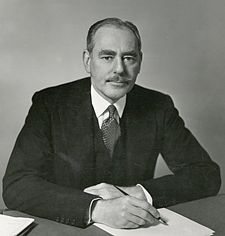 Jan 12: Secretary of State Acheston gives Asian “defensive perimeter” speech. U.S. Secretary of State Dean Acheson delivers a major speech at the National Press Club. Later called the “Defense Perimiter Speech,” Acheson counters Republican charges that the Truman Administration does not have an Asian policy following Mao Tse-tung’s (Mao Zedong) Communist takeover of mainland China. Acheson says that the “single most important fact” shaping U.S. policy is the Soviet Union’s “attaching” Mongolia, Manchuria and Sinkiang (in northwestern China) into the Soviet sphere. This, he says, gives the U.S. the opportunity of bringing upon the Soviets the “hatred and righteous anger of the Chinese people.” He warns the U.S. against pursuing “foolish adventures” that could distract the Chinese from the Soviets’ actions and divert Chinese anger toward the U.S. Acheson also surveys the moves toward independence along the Asian Pacific rim, and argues that any country that seeks help from the Soviet Union will just end up being controlled by the Soviets. Acheson says that the U.S. has a vital interest in maintaining a “defense perimeter” — a line running from the Aleutian islands to Japan and the Ryukyus islands, and down to the Philippines. This line represents, in effect, the geographic boundary of American security guarantees. After North Korea invades the South in June, critics will recall this speech and claim that Acheson inadvertently gave a green light to the Soviets and North Korea by apparently excluding South Korean from the U.S. “defense perimeter.”
Jan 12: Secretary of State Acheston gives Asian “defensive perimeter” speech. U.S. Secretary of State Dean Acheson delivers a major speech at the National Press Club. Later called the “Defense Perimiter Speech,” Acheson counters Republican charges that the Truman Administration does not have an Asian policy following Mao Tse-tung’s (Mao Zedong) Communist takeover of mainland China. Acheson says that the “single most important fact” shaping U.S. policy is the Soviet Union’s “attaching” Mongolia, Manchuria and Sinkiang (in northwestern China) into the Soviet sphere. This, he says, gives the U.S. the opportunity of bringing upon the Soviets the “hatred and righteous anger of the Chinese people.” He warns the U.S. against pursuing “foolish adventures” that could distract the Chinese from the Soviets’ actions and divert Chinese anger toward the U.S. Acheson also surveys the moves toward independence along the Asian Pacific rim, and argues that any country that seeks help from the Soviet Union will just end up being controlled by the Soviets. Acheson says that the U.S. has a vital interest in maintaining a “defense perimeter” — a line running from the Aleutian islands to Japan and the Ryukyus islands, and down to the Philippines. This line represents, in effect, the geographic boundary of American security guarantees. After North Korea invades the South in June, critics will recall this speech and claim that Acheson inadvertently gave a green light to the Soviets and North Korea by apparently excluding South Korean from the U.S. “defense perimeter.”
![]()
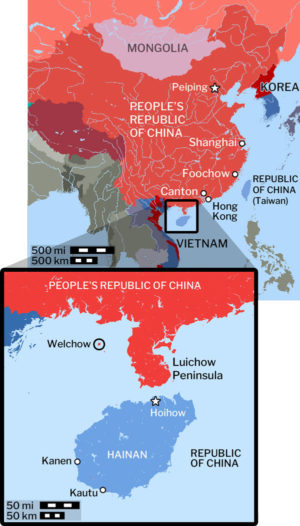 Jan 12: Chinese Nationalists jittery about threats to Hainan Island. Chinese Nationalists have been extremely nervous about the likelihood that the Chinese Communist forces may try to invade the Nationalist-held Hainan Island. Today in a dispatch from Hoihow (Haikow), the island’s capital, Nationalist forces say that Chinese Communist invaders have landed on the island’s southwestern coast and established a beachhead between Kanen (Ganchengzhen) and Kautu (Yazhou) after a 150 mile (240 km) trip from Welchow (Weizhou) Island. Those same reports say that Nationalist troops are making no moves to confront the invaders, and are concentrating their efforts on strengthening defenses on the north side of the island. The following day, the reports of the invasion will be withdrawn, with the Nationalists saying that the reported invasion was just a wild rumor that got out of hand. Meanwhile, the Nationalist Republic of China continues its war with the People’s Republic. Its Air Force bombs the Luichow (Leizhou) Peninsula, Canton (Guangzhou), Foochow (Fuzhou), and Shanghai.
Jan 12: Chinese Nationalists jittery about threats to Hainan Island. Chinese Nationalists have been extremely nervous about the likelihood that the Chinese Communist forces may try to invade the Nationalist-held Hainan Island. Today in a dispatch from Hoihow (Haikow), the island’s capital, Nationalist forces say that Chinese Communist invaders have landed on the island’s southwestern coast and established a beachhead between Kanen (Ganchengzhen) and Kautu (Yazhou) after a 150 mile (240 km) trip from Welchow (Weizhou) Island. Those same reports say that Nationalist troops are making no moves to confront the invaders, and are concentrating their efforts on strengthening defenses on the north side of the island. The following day, the reports of the invasion will be withdrawn, with the Nationalists saying that the reported invasion was just a wild rumor that got out of hand. Meanwhile, the Nationalist Republic of China continues its war with the People’s Republic. Its Air Force bombs the Luichow (Leizhou) Peninsula, Canton (Guangzhou), Foochow (Fuzhou), and Shanghai.
![]()
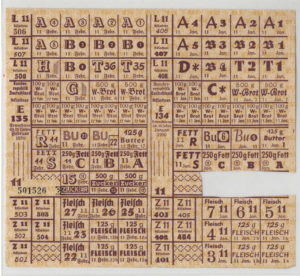 Jan 12: West Germany ends rationing for all food items except sugar. Hitler’s Nazi regime had first imposed limited rationing in 1939 immediately upon the outbreak of World War II, which became more severe as the war wore on. Rationing continued after the war under Allied occupation, and then under the Bonn government after the creation of the Federal Republic of Germany last May. Meanwhile, Britain is still rationing tea, butter, margarine, meat, sugar, and petrol. The fact that Britain still has widespread rationing while most of it has ended in West Germany will become a major campaign issue in the general election scheduled for February.
Jan 12: West Germany ends rationing for all food items except sugar. Hitler’s Nazi regime had first imposed limited rationing in 1939 immediately upon the outbreak of World War II, which became more severe as the war wore on. Rationing continued after the war under Allied occupation, and then under the Bonn government after the creation of the Federal Republic of Germany last May. Meanwhile, Britain is still rationing tea, butter, margarine, meat, sugar, and petrol. The fact that Britain still has widespread rationing while most of it has ended in West Germany will become a major campaign issue in the general election scheduled for February.
![]()
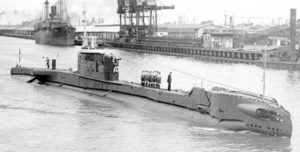 Jan 12: British submarine sinks in the Thames. The British WWII submarine HMS Truculent collides with an oil tanker in the Thames Estuary and sinks. Sixty-four crew members die, most of them from hypothermia after successfully escaping the submarine. The sub was returning from sea trials after a major re-fit.
Jan 12: British submarine sinks in the Thames. The British WWII submarine HMS Truculent collides with an oil tanker in the Thames Estuary and sinks. Sixty-four crew members die, most of them from hypothermia after successfully escaping the submarine. The sub was returning from sea trials after a major re-fit.
![]()
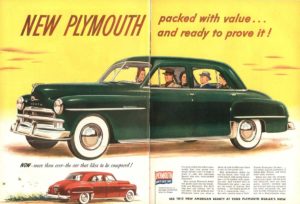 Jan 12: Plymouth dealers show new 1950 models. The entry-level Plymouth division of the Chrysler Corporation puts its 1950 models on display in dealerships across the country. The three models in nine body styles are very little changed from the year before. Improvements include larger rear windowns and re-designed lighted instrument panels. Prices start at $1,535 (about $16,800 today) for a Deluxe three-passenger coupe and top out at $2,500 (about $27,300) for a Special Deluxe station wagon.
Jan 12: Plymouth dealers show new 1950 models. The entry-level Plymouth division of the Chrysler Corporation puts its 1950 models on display in dealerships across the country. The three models in nine body styles are very little changed from the year before. Improvements include larger rear windowns and re-designed lighted instrument panels. Prices start at $1,535 (about $16,800 today) for a Deluxe three-passenger coupe and top out at $2,500 (about $27,300) for a Special Deluxe station wagon.
▲Friday, January 13
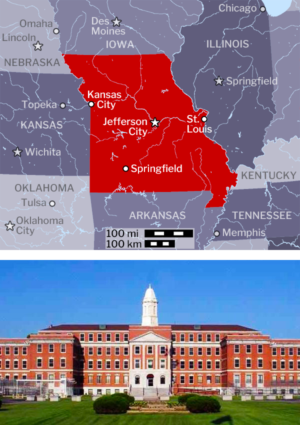 Jan 13: The judge says, “Send him to Springfield.” So he is there. Then what? A U.S. House Appropriations subcommittee looking into the Justice Department’s proposed budget for 1951 questions James V. Bennett, director of the Federal Prison System. That system includes the U.S. Medical Center for Federal Prisoners in Springfield, Missouri. Under questioning from Rep. Daniel J. Flood (D-PA), Bennett acknowledges that when homosexual men are sent to Springfield, there is little the staff there can do for them. But Bennet does reveal that the staff has conducted medical experiments on some of these men, with so-called “passive homosexuals” being given hormone treatments in a futile effort to turn them straight.
Jan 13: The judge says, “Send him to Springfield.” So he is there. Then what? A U.S. House Appropriations subcommittee looking into the Justice Department’s proposed budget for 1951 questions James V. Bennett, director of the Federal Prison System. That system includes the U.S. Medical Center for Federal Prisoners in Springfield, Missouri. Under questioning from Rep. Daniel J. Flood (D-PA), Bennett acknowledges that when homosexual men are sent to Springfield, there is little the staff there can do for them. But Bennet does reveal that the staff has conducted medical experiments on some of these men, with so-called “passive homosexuals” being given hormone treatments in a futile effort to turn them straight.
 Jan 13: Bomb explodes in front of Charlotte, North Carolina, home. A bomb explodes in the front yard of the Nonie Miller family home. No one is injured in the blast. The African-American family had recently moved to Edison Street, a majority-white neighborhood north of downtown. A cross had been burned on the family’s lawn just last month. Police Chief Frank Littlejohn reiterates his belief that the Ku Klux Klan had nothing to do with either act, despite KKK stickers and literature having been scattered across the neighborhood. Littlejohn instead blames the problems on white homeowners selling their homes to black families.
Jan 13: Bomb explodes in front of Charlotte, North Carolina, home. A bomb explodes in the front yard of the Nonie Miller family home. No one is injured in the blast. The African-American family had recently moved to Edison Street, a majority-white neighborhood north of downtown. A cross had been burned on the family’s lawn just last month. Police Chief Frank Littlejohn reiterates his belief that the Ku Klux Klan had nothing to do with either act, despite KKK stickers and literature having been scattered across the neighborhood. Littlejohn instead blames the problems on white homeowners selling their homes to black families.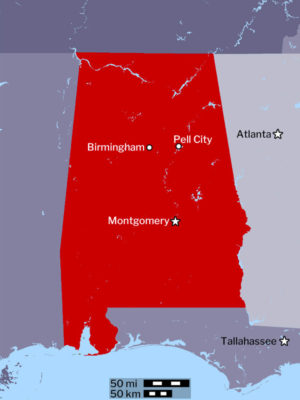 Jan 13: Poultry farmer flogged in Pell City, Alabama. Three unmasked men abduct a white poultry farmer from Pell City’s main street, drive him to a rural wooded area and flog him. J.W. Walker, 37, is lashed fifteen to twenty times with a belt, then warned to “stay out of town” and to “keep quiet.” Walker is the first reported flogging victim in Alabama since the state enacted a law outlawing the wearing of masks. The anti-Ku Klux Klan law was enacted the previous fall following a wave of floggings around Birmingham. Those floggers were masked and robed. While African-Americans are often the target of Klan activities, it’s the white victims who make the newspapers, with the Klan typically accusing their targets of running liquor, marital infidelities, not getting a job, refusing to attend church, or other perceived moral lapses. Walker was abducted just 100 feet from the police station and about a block away from a building where the local Klan meets on Friday nights.
Jan 13: Poultry farmer flogged in Pell City, Alabama. Three unmasked men abduct a white poultry farmer from Pell City’s main street, drive him to a rural wooded area and flog him. J.W. Walker, 37, is lashed fifteen to twenty times with a belt, then warned to “stay out of town” and to “keep quiet.” Walker is the first reported flogging victim in Alabama since the state enacted a law outlawing the wearing of masks. The anti-Ku Klux Klan law was enacted the previous fall following a wave of floggings around Birmingham. Those floggers were masked and robed. While African-Americans are often the target of Klan activities, it’s the white victims who make the newspapers, with the Klan typically accusing their targets of running liquor, marital infidelities, not getting a job, refusing to attend church, or other perceived moral lapses. Walker was abducted just 100 feet from the police station and about a block away from a building where the local Klan meets on Friday nights.▲Saturday, January 14
![]() Jan 14: Coal bound for schools and hospitals disappear from ral cars. Most of a railroad carload of coal disappears while in transit to schools and hospitals in Pontiac, Michigan. On January 5, forty-eight tons left the Pittsburgh Consolidated coal mine at Closplint, in Harlan County, Kentucky. When the shipment arrives in Pontiac, only eleven and a half tons remain. Pontiac officials say that the city’s schools and hospitals will be out of fuel by Monday. While several communities across the country are experiencing spot shortages, the relatively mild winter weather, coupled with industrial conservation measures and limited coal rationing for residential heating, has eased the strain somewhat on coal stockpiles.
Jan 14: Coal bound for schools and hospitals disappear from ral cars. Most of a railroad carload of coal disappears while in transit to schools and hospitals in Pontiac, Michigan. On January 5, forty-eight tons left the Pittsburgh Consolidated coal mine at Closplint, in Harlan County, Kentucky. When the shipment arrives in Pontiac, only eleven and a half tons remain. Pontiac officials say that the city’s schools and hospitals will be out of fuel by Monday. While several communities across the country are experiencing spot shortages, the relatively mild winter weather, coupled with industrial conservation measures and limited coal rationing for residential heating, has eased the strain somewhat on coal stockpiles.
▲Sunday, January 15
▲Monday, January 16
![]() Jan 16: Wildcat coal strike continues, spreads. Seventy thousand striking coal miners ignore United Mine Workers president John L. Lewis’s request that they resume their three-day-a-week slowdown schedule. The miners, employed by several “captive” steel company-owned subsidiaries, stay out from work in Pennsylvania, West Virginia and six other adjoining states. Mine owners say United Mine Workers president John L. Lewis is actually encouraging the wildcat strike, a charge that Lewis vigorously denies. The striking miners, many of them holding pickets that read “No Contract, No Work,” say that while they support Lewis generally, they won’t return to work on a three-day-a-week schedule. They say they would rather work a full five-day work schedule or none at all. Says one striking southwestern Pennsylvania miner: “When the steelworkers go on strike, nobody gets excited. But when the miner tries to get a better break for himself and his family, everyone is against him. Nobody blames the operators.” After some six months of part-time paychecks and work stoppages, 400,000 miners have lost an average of $1,300 (about $14,000 today) in wages since their contract expired last June — a loss of more than a third of their annual income. The wildcat strike will spread to almost 100,000 frustrated miners by month’s end.
Jan 16: Wildcat coal strike continues, spreads. Seventy thousand striking coal miners ignore United Mine Workers president John L. Lewis’s request that they resume their three-day-a-week slowdown schedule. The miners, employed by several “captive” steel company-owned subsidiaries, stay out from work in Pennsylvania, West Virginia and six other adjoining states. Mine owners say United Mine Workers president John L. Lewis is actually encouraging the wildcat strike, a charge that Lewis vigorously denies. The striking miners, many of them holding pickets that read “No Contract, No Work,” say that while they support Lewis generally, they won’t return to work on a three-day-a-week schedule. They say they would rather work a full five-day work schedule or none at all. Says one striking southwestern Pennsylvania miner: “When the steelworkers go on strike, nobody gets excited. But when the miner tries to get a better break for himself and his family, everyone is against him. Nobody blames the operators.” After some six months of part-time paychecks and work stoppages, 400,000 miners have lost an average of $1,300 (about $14,000 today) in wages since their contract expired last June — a loss of more than a third of their annual income. The wildcat strike will spread to almost 100,000 frustrated miners by month’s end.
▲Tuesday, January 17
![]()
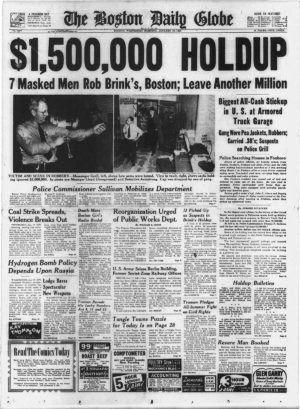 Jan 17: Robbers pull of the Great Brink’s Robbery in Boston. Between five and seven masked robbers get away with more than $1.2 million (about $13.1 million today) in cash and $1.5 million ($16.4 million today) in checks, money orders and other securities from Brink’s headquarters. The robbers enter the building at about 7:p.m., when most of the workers have gone home. They go through several locked doors to gain entrance to the building’s second floor, where five employees are engaged in their nightly work of checking and storing the money collected from Brink’s customers that day. All five employees are ordered, at gunpoint, to lie down on the floor. Their hands are tied behind their backs and adhesive tape is placed over their mouths. The robbers move methodically, suggesting that the crime has been well planned and rehearsed. A green Ford stake-bodied truck with a canvas top is seen parked outside the building at the time of the robbery. Pieces of a similar truck, cut to small pieces with an acetylene torch and smashed with sledge hammers, will be found at a dump in Stoughton. Almost seven years later, nine Boston career criminals will be tried and convicted for their role in the “Crime of the Century.” Two other strong suspects will die before they can be brought to trial. Only about $50,000 of the cash is recovered. The rest is never found.
Jan 17: Robbers pull of the Great Brink’s Robbery in Boston. Between five and seven masked robbers get away with more than $1.2 million (about $13.1 million today) in cash and $1.5 million ($16.4 million today) in checks, money orders and other securities from Brink’s headquarters. The robbers enter the building at about 7:p.m., when most of the workers have gone home. They go through several locked doors to gain entrance to the building’s second floor, where five employees are engaged in their nightly work of checking and storing the money collected from Brink’s customers that day. All five employees are ordered, at gunpoint, to lie down on the floor. Their hands are tied behind their backs and adhesive tape is placed over their mouths. The robbers move methodically, suggesting that the crime has been well planned and rehearsed. A green Ford stake-bodied truck with a canvas top is seen parked outside the building at the time of the robbery. Pieces of a similar truck, cut to small pieces with an acetylene torch and smashed with sledge hammers, will be found at a dump in Stoughton. Almost seven years later, nine Boston career criminals will be tried and convicted for their role in the “Crime of the Century.” Two other strong suspects will die before they can be brought to trial. Only about $50,000 of the cash is recovered. The rest is never found.
▲Wednesday, January 18
▲Thursday, January 19
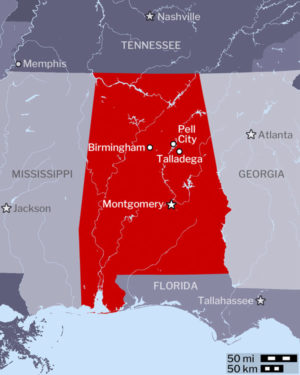 Jan 19: Barbecue stand operator in Talladega, Alabama, is abducted and flogged. Albert Watts, 51, had just closed his stand at about 7:45 p.m. and is walking to his car on the main street when two men emerge from one car parked nearby and accost him. Two others get out of a second car and join the fight. They drag Watts to the first car, hit him with the butt of a pistol and place tape across his eyes and mouth. The two automobiles then drive six miles out of town to a secluded wooded area. They pull Watts out of the car. Two men hold his arms around a tree, and others pull off his pants and beat him with a leather strap. Watts’s crime: “working Negroes in my barbecue stand.” Watts is released and makes his way across the field to a farmer’s house, who takes him to the police station. He collapses while giving a statement and is treated at a hospital. This is the second flogging within the week in the area. Sheriff Earl Howell puts up a $100 reward (about $1,100 today) and Rev. Alvin Horn offers another $25 (about $275 today). Horn, a Baptist preacher, is head of the klaverns in the Talladega and Pell City regions, and he vehemently denies that his Klans are involved in either flogging. Horn’s Klans are aligned with the Atlanta-based Association of Georgia Klans, which also sometimes calls itself the Association of American Klans under Imperial Wizard Samuel Roper. This alignment brings Horn into fierce conflict with the Birmingham-based Federated Klans of Alabama under William Hugh Morris, who has denounced Horn as a “traitor.”
Jan 19: Barbecue stand operator in Talladega, Alabama, is abducted and flogged. Albert Watts, 51, had just closed his stand at about 7:45 p.m. and is walking to his car on the main street when two men emerge from one car parked nearby and accost him. Two others get out of a second car and join the fight. They drag Watts to the first car, hit him with the butt of a pistol and place tape across his eyes and mouth. The two automobiles then drive six miles out of town to a secluded wooded area. They pull Watts out of the car. Two men hold his arms around a tree, and others pull off his pants and beat him with a leather strap. Watts’s crime: “working Negroes in my barbecue stand.” Watts is released and makes his way across the field to a farmer’s house, who takes him to the police station. He collapses while giving a statement and is treated at a hospital. This is the second flogging within the week in the area. Sheriff Earl Howell puts up a $100 reward (about $1,100 today) and Rev. Alvin Horn offers another $25 (about $275 today). Horn, a Baptist preacher, is head of the klaverns in the Talladega and Pell City regions, and he vehemently denies that his Klans are involved in either flogging. Horn’s Klans are aligned with the Atlanta-based Association of Georgia Klans, which also sometimes calls itself the Association of American Klans under Imperial Wizard Samuel Roper. This alignment brings Horn into fierce conflict with the Birmingham-based Federated Klans of Alabama under William Hugh Morris, who has denounced Horn as a “traitor.”![]() Jan 19: Soviets extend U.N. boycotts over Nationalist China representation. The Soviet Union, whose representative walked out of the United Nations Security Council two weeks ago over the body’s refusal to seat representatives from the People’s Republic of China in place of the representative from the Nationalist Chinese government on Taiwan, has expanded its boycott to encompass three more meetings at the United Nations. Soviet representatives walk out of U.N. talks on international control of atomic energy, the U.N. Military Staff Committee, and the U.N. Far Eastern Commission in protest against the continued presence of Chinese Nationalist representatives.
Jan 19: Soviets extend U.N. boycotts over Nationalist China representation. The Soviet Union, whose representative walked out of the United Nations Security Council two weeks ago over the body’s refusal to seat representatives from the People’s Republic of China in place of the representative from the Nationalist Chinese government on Taiwan, has expanded its boycott to encompass three more meetings at the United Nations. Soviet representatives walk out of U.N. talks on international control of atomic energy, the U.N. Military Staff Committee, and the U.N. Far Eastern Commission in protest against the continued presence of Chinese Nationalist representatives.
![]()
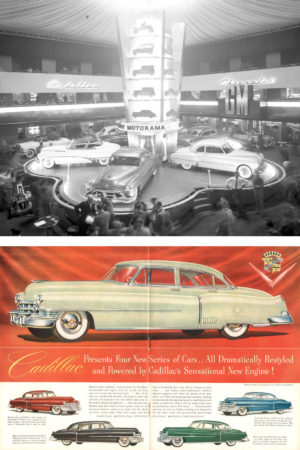 Jan 19: Cadillac shows off new 1950 models at Midcentury Motorama in New York City. Cadillac debuts the newly redesigned 1950 models at General Motors’ “Midcentury Motorama” event held at the Waldorf-Astoria Hotel in New York City. All nine models in four series feature all new styling, including one-piece windshields, no running boards, and an overall lower appearance. “Newness of styling is highlighted by a lower hood, front fender and grill treatment,” says John F. Gordon. General Motors V.P. and Cadillac General Manager. “While all models are lower, road clearance is not changed and interior head room has been maintained and in some models increased.” Headroom is an important feature in an era where men and women aren’t properly dressed without a hat. The massive Fleetwood 75 Series sits in a 146¾-inch (372¾ cm) wheelbase and consists of a seven-passenger touring sedan and a chauffer-driven Imperial. The Imperial goes for, well, if you have to ask, you probably can’t afford it. Just be prepared to shell out at least $5,110 (about $56,000 today), driver not included. The 62 Series, on a 126-inch (320 cm) wheelbase, consists of a two-door coupe, a four-door sedan, a convertible, and a Coupé de Ville hardtop, which was among the first pillarless hardtop coupes ever produced when it was first introduced late last year. The Coupé de Ville starts at $3,642 ($39,800 today). The slightly larger 60 Special is essentially a stretched and optioned-up version of the 62 Series four-door that goes for $3,920 ($42,800 today). The relatively compact 61 Series, on a 122-inch (310 cm) wheelbase is also the most affordable. The two-door goes for $2,872 ($31,400 today) and the four-door can be had for $2,977 ($32,500 today). All are powered by 160-horsepower V-8s. Hydramatic transmissions come standard in 62 and 60 Series models, and are optional on 61 and 75 Series cars.
Jan 19: Cadillac shows off new 1950 models at Midcentury Motorama in New York City. Cadillac debuts the newly redesigned 1950 models at General Motors’ “Midcentury Motorama” event held at the Waldorf-Astoria Hotel in New York City. All nine models in four series feature all new styling, including one-piece windshields, no running boards, and an overall lower appearance. “Newness of styling is highlighted by a lower hood, front fender and grill treatment,” says John F. Gordon. General Motors V.P. and Cadillac General Manager. “While all models are lower, road clearance is not changed and interior head room has been maintained and in some models increased.” Headroom is an important feature in an era where men and women aren’t properly dressed without a hat. The massive Fleetwood 75 Series sits in a 146¾-inch (372¾ cm) wheelbase and consists of a seven-passenger touring sedan and a chauffer-driven Imperial. The Imperial goes for, well, if you have to ask, you probably can’t afford it. Just be prepared to shell out at least $5,110 (about $56,000 today), driver not included. The 62 Series, on a 126-inch (320 cm) wheelbase, consists of a two-door coupe, a four-door sedan, a convertible, and a Coupé de Ville hardtop, which was among the first pillarless hardtop coupes ever produced when it was first introduced late last year. The Coupé de Ville starts at $3,642 ($39,800 today). The slightly larger 60 Special is essentially a stretched and optioned-up version of the 62 Series four-door that goes for $3,920 ($42,800 today). The relatively compact 61 Series, on a 122-inch (310 cm) wheelbase is also the most affordable. The two-door goes for $2,872 ($31,400 today) and the four-door can be had for $2,977 ($32,500 today). All are powered by 160-horsepower V-8s. Hydramatic transmissions come standard in 62 and 60 Series models, and are optional on 61 and 75 Series cars.
▲Friday, January 20
▲Saturday, January 21
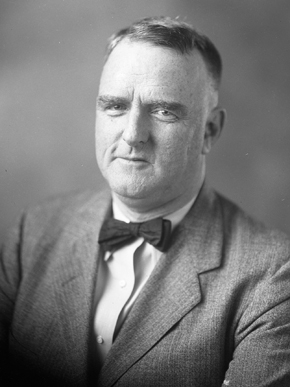 Jan 21: Dixiecrats invite Eisenhower to run on “States Rights,” denounce foreign-born and second-generation citizens as not “real Americans.” At meeting of Dixiecrats in Montgomery, Alabama, chairman Gessner T. McCorvey invites the Republicans to nominate Gen. Dwight D. Eisenhower for President in 1952. McCorvey also chairs the Alabama Democratic Executive Committee and helped lead the Dixiecrat revolt in 1948. He denounces the national Democratic Party for “endeavoring to force on the Southland” a civil rights program that makes it “utterly impossible for self-respecting Southern white men and women to be affiliated with the group of Socialists who style themselves the national Democratic Party.” He accuses the national party of engaging in “efforts to sacrifice the South and all of our traditions and civilization in exchange for the votes of the Negroes in Harlem and in the slums of other Northern and Eastern cities.” McCorvey proposes a solution to hold the national party at bay: “As a practical proposition, I thing that in 1952 the Southern states should nominate their presidential electors prior to the national conventions of the major parties, let the presidential electors get together and pick out some outstanding American who stands for states’ rights — such as we did in 1948 — announce that we will support him for President, and then, if one of the major political parties comes along later and nominates the same man that we have nominated that will be perfectly all right, and we will let them share with us the glory of electing a President.” McCorvey suggests that Eisenhower is the perfect choice. “Every utterance that I have seen from General Eisenhower, a native of Texas, has indicated that he believes in the principle of States’s Rights.” McCorvey closes his address by labelling the North the natural enemies of the South. “We have here in the South the purest Anglo-Saxon blood in the Western Hemisphere,” he says. “In Alabama and other southeastern states, the percentage of foreign-born population and native-born population with foreign-born parents is less than two per cent, while in the state of New York, taken as a whole, the percentage of foreign-born population and native born population with foreign-born parents, like Mayor La Guardia, for example, is 43 percent, while in the city of New York — now listen to this — the percentage of foreign-born population and native-born population with foreign-born parents is the astounding figure of 69 per cent. Just think of people from that section of the country comparing themselves to Alabamians when it comes to considering who are the real Americans.”
Jan 21: Dixiecrats invite Eisenhower to run on “States Rights,” denounce foreign-born and second-generation citizens as not “real Americans.” At meeting of Dixiecrats in Montgomery, Alabama, chairman Gessner T. McCorvey invites the Republicans to nominate Gen. Dwight D. Eisenhower for President in 1952. McCorvey also chairs the Alabama Democratic Executive Committee and helped lead the Dixiecrat revolt in 1948. He denounces the national Democratic Party for “endeavoring to force on the Southland” a civil rights program that makes it “utterly impossible for self-respecting Southern white men and women to be affiliated with the group of Socialists who style themselves the national Democratic Party.” He accuses the national party of engaging in “efforts to sacrifice the South and all of our traditions and civilization in exchange for the votes of the Negroes in Harlem and in the slums of other Northern and Eastern cities.” McCorvey proposes a solution to hold the national party at bay: “As a practical proposition, I thing that in 1952 the Southern states should nominate their presidential electors prior to the national conventions of the major parties, let the presidential electors get together and pick out some outstanding American who stands for states’ rights — such as we did in 1948 — announce that we will support him for President, and then, if one of the major political parties comes along later and nominates the same man that we have nominated that will be perfectly all right, and we will let them share with us the glory of electing a President.” McCorvey suggests that Eisenhower is the perfect choice. “Every utterance that I have seen from General Eisenhower, a native of Texas, has indicated that he believes in the principle of States’s Rights.” McCorvey closes his address by labelling the North the natural enemies of the South. “We have here in the South the purest Anglo-Saxon blood in the Western Hemisphere,” he says. “In Alabama and other southeastern states, the percentage of foreign-born population and native-born population with foreign-born parents is less than two per cent, while in the state of New York, taken as a whole, the percentage of foreign-born population and native born population with foreign-born parents, like Mayor La Guardia, for example, is 43 percent, while in the city of New York — now listen to this — the percentage of foreign-born population and native-born population with foreign-born parents is the astounding figure of 69 per cent. Just think of people from that section of the country comparing themselves to Alabamians when it comes to considering who are the real Americans.”![]()
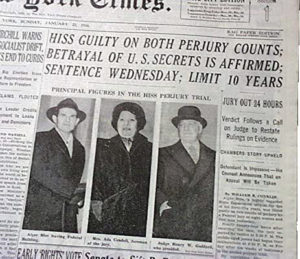 Jan 21: Alger Hiss convicted of perjury. Former State Department official Alger Hiss, a highly-regarded State Department official for ten years, is convicted by a federal jury of two counts of perjury in connection with accusations that he had been a Soviet spy. The ten-week trial is the second, after the first trial ended in a hung jury last July. The jury finds him guilty of lying to a federal grand jury about whether he had seen columnist Whitaker Chambers after 1936, and about whether he had passed secret documents to Chambers in 1938 for a Soviet spy ring. Chambers had also committed perjury by denying that he had ever been a Communist, but he later admitted that he had, indeed, been one. Chambers was never prosecuted for perjury, but instead became a star witness against Hiss. With this guilty verdict, the government has effectively labeled Hiss a Communist spy. Hiss cannot be charged with espionage because the statute of limitations passed in 1941, three years after the alleged activity took place.
Jan 21: Alger Hiss convicted of perjury. Former State Department official Alger Hiss, a highly-regarded State Department official for ten years, is convicted by a federal jury of two counts of perjury in connection with accusations that he had been a Soviet spy. The ten-week trial is the second, after the first trial ended in a hung jury last July. The jury finds him guilty of lying to a federal grand jury about whether he had seen columnist Whitaker Chambers after 1936, and about whether he had passed secret documents to Chambers in 1938 for a Soviet spy ring. Chambers had also committed perjury by denying that he had ever been a Communist, but he later admitted that he had, indeed, been one. Chambers was never prosecuted for perjury, but instead became a star witness against Hiss. With this guilty verdict, the government has effectively labeled Hiss a Communist spy. Hiss cannot be charged with espionage because the statute of limitations passed in 1941, three years after the alleged activity took place.
▲Sunday, January 22
![]()
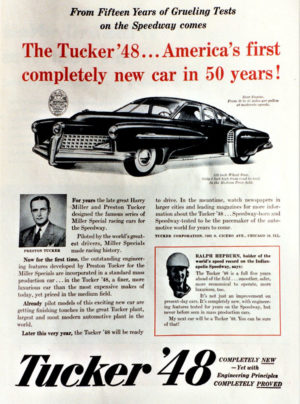 Jan 22: Jury clears Preston Tucker of fraud and conspiracy charges. A federal jury in Chicago clears automotive entrepreneur Preston Tucker of all mail fraud and conspiracy charges that grew out of the management and $28 million financing of his revolutionary car, the Tucker 48. While Tucker is exonerated in court, his automotive venture has already filed for bankruptcy after having produced only fifty-one models, including the first prototype. Had the Tucker 48 gone on the market, it would have introduced a plethora of innovations for the American market. It would have been the first rear-engine, rear-drive modern American production car, sporting a third directional headline that moves with the steering wheel. Other features include: a perimeter frame and roll bar for protection, a shatter-proof windshield, padded dashboard, seat belts, crumple zones in the front. The engine and transmission are mounted on an easily-removable subframe that can be lowered from the car in minutes. Tucker had envisioned that dealers would be able to swap out loaner engines in thirty minutes instead of leaving the entire car for a day or more for service. But an SEC investigation that led to fraud and conspiracy charges, and the accompanying negative publicity, has already doomed the young car company.
Jan 22: Jury clears Preston Tucker of fraud and conspiracy charges. A federal jury in Chicago clears automotive entrepreneur Preston Tucker of all mail fraud and conspiracy charges that grew out of the management and $28 million financing of his revolutionary car, the Tucker 48. While Tucker is exonerated in court, his automotive venture has already filed for bankruptcy after having produced only fifty-one models, including the first prototype. Had the Tucker 48 gone on the market, it would have introduced a plethora of innovations for the American market. It would have been the first rear-engine, rear-drive modern American production car, sporting a third directional headline that moves with the steering wheel. Other features include: a perimeter frame and roll bar for protection, a shatter-proof windshield, padded dashboard, seat belts, crumple zones in the front. The engine and transmission are mounted on an easily-removable subframe that can be lowered from the car in minutes. Tucker had envisioned that dealers would be able to swap out loaner engines in thirty minutes instead of leaving the entire car for a day or more for service. But an SEC investigation that led to fraud and conspiracy charges, and the accompanying negative publicity, has already doomed the young car company.
▲Monday, January 23
![]() Jan 23: Israel declares Jerusalem nation’s capita. The Israeli Knesset passes a resolution declaring that Jerusalem automatically became the nation’s capital from the moment the Jewish state was declared in 1948. The resolution is considered a compromise between moderates and extremists. In a face-saving move, the Knesset is given the opportunity to vote down an amendment making the resolution applicable to the entire city, including the Old City that is under Jordanian occupation. Some ruling coalition supporters find the resolution awkward, but by voting down the amendment, they can stake a political position that is arguably less hardline. Before the vote, Prime Minister David Ben-Gurion repeats his stand that King David made Jerusalem the capital of Israel 3,000 years ago and that it remained so with Israel’s rebirth. The resolution welcomes the return the the Knesset to Jerusalem from Tel Aviv and calls on the government to speed up the building of government and Knesset buildings in Jerusalem.
Jan 23: Israel declares Jerusalem nation’s capita. The Israeli Knesset passes a resolution declaring that Jerusalem automatically became the nation’s capital from the moment the Jewish state was declared in 1948. The resolution is considered a compromise between moderates and extremists. In a face-saving move, the Knesset is given the opportunity to vote down an amendment making the resolution applicable to the entire city, including the Old City that is under Jordanian occupation. Some ruling coalition supporters find the resolution awkward, but by voting down the amendment, they can stake a political position that is arguably less hardline. Before the vote, Prime Minister David Ben-Gurion repeats his stand that King David made Jerusalem the capital of Israel 3,000 years ago and that it remained so with Israel’s rebirth. The resolution welcomes the return the the Knesset to Jerusalem from Tel Aviv and calls on the government to speed up the building of government and Knesset buildings in Jerusalem.
▲Tuesday, January 24
![]()
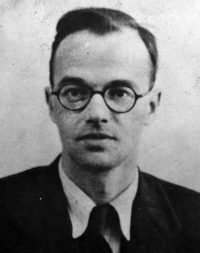 Jan 24: Klaus Fuchs arrested on espionage charges. German-born physicist Klaus Fuchs, an émigré to the U.K. who worked for British and American nuclear research programs, confesses to MI5 that since 1943 he had spied on behalf of the Soviet Union. While stationed at Los Alamos during World War II, he had given the Soviets precise information, including blueprints, of the atomic bomb dropped on Nagasaki, Japan. Especially worrying for the U.S. and U.K., he reveals that he had also passed along much of what American scientists had postulated about a theoretical hydrogen bomb. Fuchs’s confession, which will not be publicly announced until February 3, identifies American lab chemist Harry Gold as his courier to the U.S.S.R. Gold, in turn, will implicate Julius and Ethel Rosenberg.
Jan 24: Klaus Fuchs arrested on espionage charges. German-born physicist Klaus Fuchs, an émigré to the U.K. who worked for British and American nuclear research programs, confesses to MI5 that since 1943 he had spied on behalf of the Soviet Union. While stationed at Los Alamos during World War II, he had given the Soviets precise information, including blueprints, of the atomic bomb dropped on Nagasaki, Japan. Especially worrying for the U.S. and U.K., he reveals that he had also passed along much of what American scientists had postulated about a theoretical hydrogen bomb. Fuchs’s confession, which will not be publicly announced until February 3, identifies American lab chemist Harry Gold as his courier to the U.S.S.R. Gold, in turn, will implicate Julius and Ethel Rosenberg.
![]()
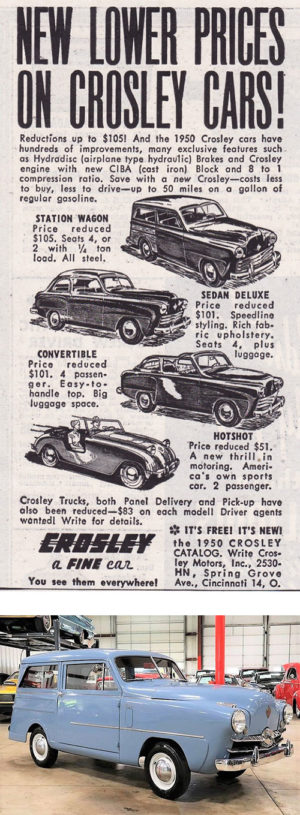 Jan 24: Crosley Motors updates line for 1950. The innovative but now struggling Crosley Motors introduces its updated 1950 subcompact line today. Crosley Motors is a closely-held spin-off of Cincinnati-based Crosley Corporation, which is a well-known radio and home appliance manufacturer, and broadcaster (WLW was for many years the world’s most powerful broadcast station with listeners as far away as Germany). Crosley Motors makes subcompacts only, having introduced the first compact car to American consumers in 1939, and it has stuck with the 80-inch (203 cm) wheelbase ever since. Crosley offers six models, and all are under the magic $1,000 mark (about $11,000 today). A tiny two-seat Hotshot roadster goes for $899 ($9,800 today), four-passenger sedans and convertibles are $929 ($10,150 today), and a station wagon is available for $959 ($10,500 today). The cheapest offering is a ¼ ton pickup truck at $884 ($9,650 today), and a ¼ ton panel truck at $909 ($9,900 today) rounds out the offerings. All of those prices are unchanged from 1949. Crosley enjoyed a brief moment of popularity with a car-starved public when civilian production resumed in 1946. Crosley’s post-war models used an innovative, lightweight CoBra (for Copper Brazed) engine that was developed for military use. With the military’s strict maintenance procedures, it was very reliable. With civilian carelessness however, corrosion became a major problem. By 1949, Crosley’s reputation sank. Crosley replaced the CoBra with an engine using a traditional cast-iron block and made replacement engines available to owners of older models. But in the meantine, other American carmakers have introduced more lavish cars that are priced, in some cases, only a little more than a new Crosley. Sales of Crosleys plunge from a peak in 1948 of 27,707 cars to only 7,612 in 1950 despite price cuts of as much of $100 in June.
Jan 24: Crosley Motors updates line for 1950. The innovative but now struggling Crosley Motors introduces its updated 1950 subcompact line today. Crosley Motors is a closely-held spin-off of Cincinnati-based Crosley Corporation, which is a well-known radio and home appliance manufacturer, and broadcaster (WLW was for many years the world’s most powerful broadcast station with listeners as far away as Germany). Crosley Motors makes subcompacts only, having introduced the first compact car to American consumers in 1939, and it has stuck with the 80-inch (203 cm) wheelbase ever since. Crosley offers six models, and all are under the magic $1,000 mark (about $11,000 today). A tiny two-seat Hotshot roadster goes for $899 ($9,800 today), four-passenger sedans and convertibles are $929 ($10,150 today), and a station wagon is available for $959 ($10,500 today). The cheapest offering is a ¼ ton pickup truck at $884 ($9,650 today), and a ¼ ton panel truck at $909 ($9,900 today) rounds out the offerings. All of those prices are unchanged from 1949. Crosley enjoyed a brief moment of popularity with a car-starved public when civilian production resumed in 1946. Crosley’s post-war models used an innovative, lightweight CoBra (for Copper Brazed) engine that was developed for military use. With the military’s strict maintenance procedures, it was very reliable. With civilian carelessness however, corrosion became a major problem. By 1949, Crosley’s reputation sank. Crosley replaced the CoBra with an engine using a traditional cast-iron block and made replacement engines available to owners of older models. But in the meantine, other American carmakers have introduced more lavish cars that are priced, in some cases, only a little more than a new Crosley. Sales of Crosleys plunge from a peak in 1948 of 27,707 cars to only 7,612 in 1950 despite price cuts of as much of $100 in June.
▲Tuesday, Wednesday 25
![]() Jan 25: Alger Hiss sentenced to five years in prison, remains free pending appeal. Alger Hiss, who was convicted last week of two counts of perjury, is sentenced to five years in prison. Each count brings up to five years in prison, but the judge specifies that the sentences will run concurrently. Hiss remains out on bail pending his appeal.
Jan 25: Alger Hiss sentenced to five years in prison, remains free pending appeal. Alger Hiss, who was convicted last week of two counts of perjury, is sentenced to five years in prison. Each count brings up to five years in prison, but the judge specifies that the sentences will run concurrently. Hiss remains out on bail pending his appeal.
![]() Jan 25: Secretary of State Acheson will not “turn my back” on Alger Hiss. Secretary of State Dean Acheson tells a news conference that regardless of what the courts or others might do, “I do not intend to turn my back on Alger Hiss.” He cites as his guiding principles those “stated on the Mount of Olives.” Acheson has already been under fire in the Senate for having told a Senate committee last year that he had “known Alger Hiss and his brother David from childhood and would vouch for them absolutely.” Acheston’s latest remarks quickly blow up to become a major political issue. Republicans and Southern Democrats will demand Acheson’s resignation.
Jan 25: Secretary of State Acheson will not “turn my back” on Alger Hiss. Secretary of State Dean Acheson tells a news conference that regardless of what the courts or others might do, “I do not intend to turn my back on Alger Hiss.” He cites as his guiding principles those “stated on the Mount of Olives.” Acheson has already been under fire in the Senate for having told a Senate committee last year that he had “known Alger Hiss and his brother David from childhood and would vouch for them absolutely.” Acheston’s latest remarks quickly blow up to become a major political issue. Republicans and Southern Democrats will demand Acheson’s resignation.
![]()
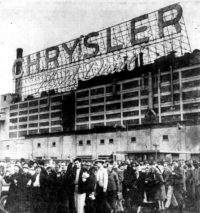 Jan 25: Chrysler workers go on strike. Contract negotiations between the United Auto Workers and Chrysler, which have been going on for six months now, break down over pension benefits, leading 85,000 auto workers to walk off the job. Another 23,000 workers are idle at Briggs Manufacturing, which makes bodies for Chrysler. The strike will last until May.
Jan 25: Chrysler workers go on strike. Contract negotiations between the United Auto Workers and Chrysler, which have been going on for six months now, break down over pension benefits, leading 85,000 auto workers to walk off the job. Another 23,000 workers are idle at Briggs Manufacturing, which makes bodies for Chrysler. The strike will last until May.
![]() Jan 25: Minimum wage rises. The U.S. Minimum Wage increases from 40 cents an hour (4.25 today) to 75 cents an hour ($8.00 today).
Jan 25: Minimum wage rises. The U.S. Minimum Wage increases from 40 cents an hour (4.25 today) to 75 cents an hour ($8.00 today).
▲Thursday, January 26
Australia Day
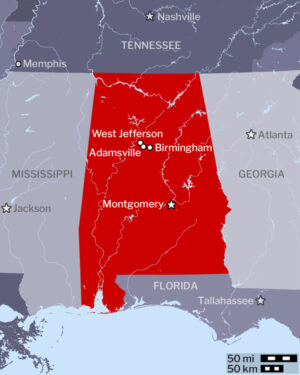 Jan 26: Klan warns Alabama resident: “We are watching you.” Ottie Stevens, 48, of Tilleytown, reports that masked Klansmen attending services at a nearby church affixed a warning sticker and a note to the inside of his car windshield. The car is parked in front of the Stevens residence, a short distance from a church. Stevens’s wife says she saw the Klansmen, wearing masks in violation of the state’s anti-masking law, walking around outside of the church after services ended. Stevens says he doesn’t know why he was singled out for the warning, but his nephew was a flogging victim of the Klan last spring. A wave of flogging of white victims by robed and masked Klansmen last year finally prompted the Alabama legislature to enact a new law banning the wearing of masks in public. Much of that flogging activity has been linked to the Adamsville Klan. There are reports that the Adamsville Klan moved its headquarters to West Jefferson after raids drew scrutiny to Adamsville. Tilleytown, the unofficial name of a stretch of road near the church, is located just outside of West Jefferson.
Jan 26: Klan warns Alabama resident: “We are watching you.” Ottie Stevens, 48, of Tilleytown, reports that masked Klansmen attending services at a nearby church affixed a warning sticker and a note to the inside of his car windshield. The car is parked in front of the Stevens residence, a short distance from a church. Stevens’s wife says she saw the Klansmen, wearing masks in violation of the state’s anti-masking law, walking around outside of the church after services ended. Stevens says he doesn’t know why he was singled out for the warning, but his nephew was a flogging victim of the Klan last spring. A wave of flogging of white victims by robed and masked Klansmen last year finally prompted the Alabama legislature to enact a new law banning the wearing of masks in public. Much of that flogging activity has been linked to the Adamsville Klan. There are reports that the Adamsville Klan moved its headquarters to West Jefferson after raids drew scrutiny to Adamsville. Tilleytown, the unofficial name of a stretch of road near the church, is located just outside of West Jefferson.▲Friday, January 27
![]() Jan 27: NATO joint defense plan goes into effect. President Harry Truman proclaims the NATO joint defense plan in effect beginning today as the U.S. signs individual mutual defense treaties with each NATO member state. They are: Belgium, Denmark, France, Italy, Luxembourg, the Netherlands, Norway and the United Kingdom. These agreements will enable these countries to receive $1 billion (about $11 billion today) in U.S. arms and equipment. An accompanying Executive order gives Truman’s approval for an integrated mutual defense plan drawn up in Paris last month by NATO’s Defense Committee.
Jan 27: NATO joint defense plan goes into effect. President Harry Truman proclaims the NATO joint defense plan in effect beginning today as the U.S. signs individual mutual defense treaties with each NATO member state. They are: Belgium, Denmark, France, Italy, Luxembourg, the Netherlands, Norway and the United Kingdom. These agreements will enable these countries to receive $1 billion (about $11 billion today) in U.S. arms and equipment. An accompanying Executive order gives Truman’s approval for an integrated mutual defense plan drawn up in Paris last month by NATO’s Defense Committee.
![]()
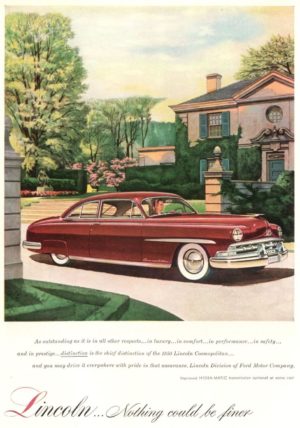 Jan 27: New 1950 Lincolns appear in dealer showrooms. The Lincoln-Mercury Division of the Ford Motor Company puts its 1950 Lincolns on display at dealers nationwide. The two Lincoln models are very little changed from last year, with only a few tweaks here and there to respond to criticisms that the smaller one looks too much like its less expensive Mercury sibling. The basic Lincoln is available as a two-door and four-door, and starts at $2,621 (about $28,600 today). The larger Lincoln Cosmopolitan is also available in two-door and four-door versions starting at $3,288 ($35,900 today), plus a two-door convertible for $4,050 ($44,200 today). Ford’s automatic transmission isn’t ready for market, so Lincoln offers Hydramatic transmissions sourced from G.M. as a $174 ($1,900 today) option. The Cosmopolitans feature a unique electrical/hydraulic automatic window system. Push a button, and an electric motor pressurizes the hoses that raise the window. Push another button, and you hear an almost silent whissssh as the pressure is released and the window gracefully lowers. A similar system powers the front seat. Both models retain the 158-horsepower flathead V-8s that started life as a truck engine. Some customers complain about its vibration, although Ford has done a lot to reduce the noise. The roof and dashboard are stuffed with fiberglas soundproofing insulation, making the Lincolns’ interiors among the quietest on the road. When the Lincolns were new and fresh in 1949, Ford sold 73,507 of them. Just one model year later, they will produce only 28,150 of them, a nearly 60% drop.
Jan 27: New 1950 Lincolns appear in dealer showrooms. The Lincoln-Mercury Division of the Ford Motor Company puts its 1950 Lincolns on display at dealers nationwide. The two Lincoln models are very little changed from last year, with only a few tweaks here and there to respond to criticisms that the smaller one looks too much like its less expensive Mercury sibling. The basic Lincoln is available as a two-door and four-door, and starts at $2,621 (about $28,600 today). The larger Lincoln Cosmopolitan is also available in two-door and four-door versions starting at $3,288 ($35,900 today), plus a two-door convertible for $4,050 ($44,200 today). Ford’s automatic transmission isn’t ready for market, so Lincoln offers Hydramatic transmissions sourced from G.M. as a $174 ($1,900 today) option. The Cosmopolitans feature a unique electrical/hydraulic automatic window system. Push a button, and an electric motor pressurizes the hoses that raise the window. Push another button, and you hear an almost silent whissssh as the pressure is released and the window gracefully lowers. A similar system powers the front seat. Both models retain the 158-horsepower flathead V-8s that started life as a truck engine. Some customers complain about its vibration, although Ford has done a lot to reduce the noise. The roof and dashboard are stuffed with fiberglas soundproofing insulation, making the Lincolns’ interiors among the quietest on the road. When the Lincolns were new and fresh in 1949, Ford sold 73,507 of them. Just one model year later, they will produce only 28,150 of them, a nearly 60% drop.
▲Saturday, January 28
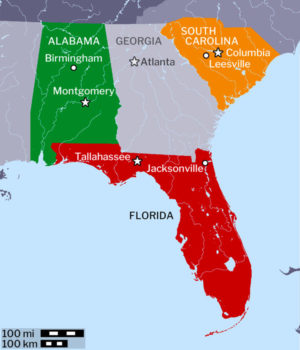 Jan 28: Three KKK groups agree to merger. Three splinter Ku Klux Klan groups meet in Jacksonville, Florida, and agree to merge into a single united body. The meeting brings together the Federated Klans of Alabama headed by Hugh Morris of Birmingham, the Southern Knights of the Ku Klux Klan headed by Bill Hendrix of Tallahassee, and the Association of Carolina Klans headed by Thomas L. Hamilton of Leesville, S.C. One group is conspicuously absent: the Association of Georgia Klans, headed by Samuel Roper of Atlanta. The new group elects an emperor, identified only as Nathan II. The newly united Klan calls for militant action against “hate movements,” and singles out the Federal Council of Churches of Christ in America, B’nai B’rith, the NAACP, and “the more than 1,000 pro-Communist organizations in the United States.” The Klan acknowledges that the Roman Catholic Church is also fighting communism, but says that its “clerical hierarchy” is totalitarian and “must not be permitted to dominate and control the fight against communism. … The spirit of liberty still lives in the hearts of the common people of the United States belonging to the white Protestant native-born group.”
Jan 28: Three KKK groups agree to merger. Three splinter Ku Klux Klan groups meet in Jacksonville, Florida, and agree to merge into a single united body. The meeting brings together the Federated Klans of Alabama headed by Hugh Morris of Birmingham, the Southern Knights of the Ku Klux Klan headed by Bill Hendrix of Tallahassee, and the Association of Carolina Klans headed by Thomas L. Hamilton of Leesville, S.C. One group is conspicuously absent: the Association of Georgia Klans, headed by Samuel Roper of Atlanta. The new group elects an emperor, identified only as Nathan II. The newly united Klan calls for militant action against “hate movements,” and singles out the Federal Council of Churches of Christ in America, B’nai B’rith, the NAACP, and “the more than 1,000 pro-Communist organizations in the United States.” The Klan acknowledges that the Roman Catholic Church is also fighting communism, but says that its “clerical hierarchy” is totalitarian and “must not be permitted to dominate and control the fight against communism. … The spirit of liberty still lives in the hearts of the common people of the United States belonging to the white Protestant native-born group.”![]()
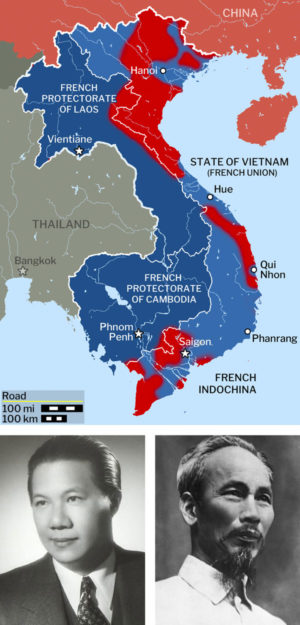 Jan 28: France approves limited self-government for Vietnam. The French National Assembly votes 401-193 to approve limited self-government for the State of Vietnam within the French Union. The extent of the state’s sovereignty is limited, with France retaining control of foreign policy and all military affairs. The Assembly names former emperor Bao Dai as head of state for Vietnam rather than as a monarch. The State of Vietnam’s control is mainly in the South, while the Soviet-backed Democratic Republic of Vietnam (DRV) controls much of the the North, the central coastal areas, the far south and areas near Saigon. Saigon is reaffirmed as Vietnam’s capital, but Bao Dai maintains his headquarters in Phanrang due to Viet Minh activities near Saigon. Ho Chi Min, who heads the DRV and the Viet Minh resistance movement, mocks the State of Vietnam’s quasi-independent status. He says his movement is fighting for “real independence, not Bao Dai independence.”
Jan 28: France approves limited self-government for Vietnam. The French National Assembly votes 401-193 to approve limited self-government for the State of Vietnam within the French Union. The extent of the state’s sovereignty is limited, with France retaining control of foreign policy and all military affairs. The Assembly names former emperor Bao Dai as head of state for Vietnam rather than as a monarch. The State of Vietnam’s control is mainly in the South, while the Soviet-backed Democratic Republic of Vietnam (DRV) controls much of the the North, the central coastal areas, the far south and areas near Saigon. Saigon is reaffirmed as Vietnam’s capital, but Bao Dai maintains his headquarters in Phanrang due to Viet Minh activities near Saigon. Ho Chi Min, who heads the DRV and the Viet Minh resistance movement, mocks the State of Vietnam’s quasi-independent status. He says his movement is fighting for “real independence, not Bao Dai independence.”
▲Sunday, January 29
▲Monday, January 30
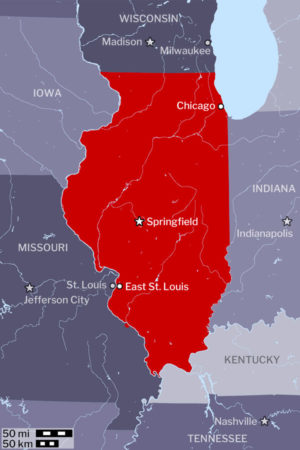 Jan 30: East St. Louis schools integrate. Schools in East St. Louis, Illinois, quietly integrate without incident as the school system begins its second semester. Beginning today, parents may opt to send their children to a school located closer to their home instead of a school reserved for their race. Parents of 109 African-American students transfer their children to previously all-white schools, while two white students begin classes in a formerly all-black high school. Assistant superintendent Dr. L.G. Osborn says that ending the 85-year-old policy of segregation was inevitable. There are 8,000 white and 5,200 African-American students in the school system. But because the black population is growing and the white population in shrinking, the school system would have to build a new eight-room school building every two years in order to maintain segregation. Racial segregation in public schools have long been illegal in Illinois, but the law has been routinely ignored in the southern part of the state. But a new regulation enacted last year would deny state funds to segregated school districts. East St. Louis schools stand to lose $678,000 a year (about $7.4 million today) in state funding. Only one school, the Alta Sita School, experiences a higher than normal absentee rate among its white students. At Senior High School, where fifteen African-American students are now enrolled, Gus Goss, the 6-foot, 7-inch-tall star of the Lincoln High School basketball team is personally welcomed by Coach Lewis Dehner.
Jan 30: East St. Louis schools integrate. Schools in East St. Louis, Illinois, quietly integrate without incident as the school system begins its second semester. Beginning today, parents may opt to send their children to a school located closer to their home instead of a school reserved for their race. Parents of 109 African-American students transfer their children to previously all-white schools, while two white students begin classes in a formerly all-black high school. Assistant superintendent Dr. L.G. Osborn says that ending the 85-year-old policy of segregation was inevitable. There are 8,000 white and 5,200 African-American students in the school system. But because the black population is growing and the white population in shrinking, the school system would have to build a new eight-room school building every two years in order to maintain segregation. Racial segregation in public schools have long been illegal in Illinois, but the law has been routinely ignored in the southern part of the state. But a new regulation enacted last year would deny state funds to segregated school districts. East St. Louis schools stand to lose $678,000 a year (about $7.4 million today) in state funding. Only one school, the Alta Sita School, experiences a higher than normal absentee rate among its white students. At Senior High School, where fifteen African-American students are now enrolled, Gus Goss, the 6-foot, 7-inch-tall star of the Lincoln High School basketball team is personally welcomed by Coach Lewis Dehner.![]()
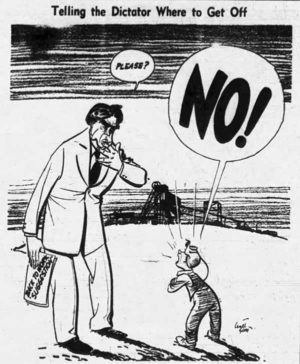 Jan 30: Wildcat coal strike spreads in defiance of UMW orders. The United Mine Workers’ wildcat strike against steel company-owned coal operators continues to spread despite instructions from union officials. When top UMW leaders send a sharply-worded order to return to work to a 900-man local in Rosedale, Pennsylvania, the miners respond by not only staying off the job, but by picketing other mines in central Pennsylvania. That local alone is credited with adding 10,000 area miners to the strike ranks. An estimated 100,000 miners are now off the job. Meanwhile, the Baltimore and Ohio Railroad announced that it will have to lay off 3,800 shop workers due to cutbacks in routes served by coal-powered trains.
Jan 30: Wildcat coal strike spreads in defiance of UMW orders. The United Mine Workers’ wildcat strike against steel company-owned coal operators continues to spread despite instructions from union officials. When top UMW leaders send a sharply-worded order to return to work to a 900-man local in Rosedale, Pennsylvania, the miners respond by not only staying off the job, but by picketing other mines in central Pennsylvania. That local alone is credited with adding 10,000 area miners to the strike ranks. An estimated 100,000 miners are now off the job. Meanwhile, the Baltimore and Ohio Railroad announced that it will have to lay off 3,800 shop workers due to cutbacks in routes served by coal-powered trains.
▲Tuesday, January 31
![]()
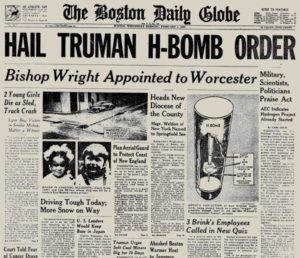 Jan 31: Truman orders hydrogen bomb development. President Truman orders the development of the hydrogen bomb. A White House statement from the President reads: “It is part of my responsibility as Commander in Chief of the armed forces to see to it that our country is able to defend itself against any possible aggressor. Accordingly, I have directed the Atomic Energy Commission to continue its work on all forms of atomic weapons, including the so-called hydrogen or super-bomb. Like all other work in the field of atomic weapons, it is being and will be carried forward on a basis consistent with the over-all objectives of our program for peace and security.”The H-bomb’s development will continue “until a satisfactory plan for international control of atomic energy is achieved.” The announcement follows more than a month of growing political pressure from both parties. Truman’s order is widely praised as a vital step to keep ahead of the Soviets following their successful atomic bomb detonation in September. It is also likely that private pressure on Truman intensified following the arrest one week earlier in Britain of atomic physicist Klaus Fuchs for espionage, even though Fuchs’s arrest won’t be made public until February 3.
Jan 31: Truman orders hydrogen bomb development. President Truman orders the development of the hydrogen bomb. A White House statement from the President reads: “It is part of my responsibility as Commander in Chief of the armed forces to see to it that our country is able to defend itself against any possible aggressor. Accordingly, I have directed the Atomic Energy Commission to continue its work on all forms of atomic weapons, including the so-called hydrogen or super-bomb. Like all other work in the field of atomic weapons, it is being and will be carried forward on a basis consistent with the over-all objectives of our program for peace and security.”The H-bomb’s development will continue “until a satisfactory plan for international control of atomic energy is achieved.” The announcement follows more than a month of growing political pressure from both parties. Truman’s order is widely praised as a vital step to keep ahead of the Soviets following their successful atomic bomb detonation in September. It is also likely that private pressure on Truman intensified following the arrest one week earlier in Britain of atomic physicist Klaus Fuchs for espionage, even though Fuchs’s arrest won’t be made public until February 3.
![]() Jan 31: House GOP kills economic aid to South Korea. Republican opposition, helped by Southern Democrats, kill an economic aid package extending $60 million (about $645 million today) in non-military assistance to South Korea. The bill is voted down amid criticism that Truman’s State Department has no “positive and complete policy” against Communist China. The bill’s exclusive focus on South Korea and exclusion of the Nationalist Republic of China government on Taiwan leads to charges that the Truman administration is using a piecemeal approach, which would render these expenditures ineffective. Repubican and Southern Democratic opposition has been made especially intense following Truman’s statement earlier this month that the U.S. will not provide military assistance to Taiwan.
Jan 31: House GOP kills economic aid to South Korea. Republican opposition, helped by Southern Democrats, kill an economic aid package extending $60 million (about $645 million today) in non-military assistance to South Korea. The bill is voted down amid criticism that Truman’s State Department has no “positive and complete policy” against Communist China. The bill’s exclusive focus on South Korea and exclusion of the Nationalist Republic of China government on Taiwan leads to charges that the Truman administration is using a piecemeal approach, which would render these expenditures ineffective. Repubican and Southern Democratic opposition has been made especially intense following Truman’s statement earlier this month that the U.S. will not provide military assistance to Taiwan.
![]() Jan 31: Soviet Union recognizes Ho Chi Minh’s rebel government of Vietnam. The Soviet Union announces its recognition of the Democratic Republic of Vietnam, led by Ho Chi Minh. Ho’s Viet Minh resistance movement has been fighting for Vietnam’s full independence from France. The Soviet move comes two days after France established the quasi-independent State of Vietnam, headed by former emperor Bao Dai. The Soviets begin supplying aid to the Vietminh Communist resistance fighters against the French-backed State. France vigorously protests the Soviet recognition, but the French government is itself hobbled by internal division and instability as it tries to approve a budget that is heavily-laden with expenditures for defending Vietnam.
Jan 31: Soviet Union recognizes Ho Chi Minh’s rebel government of Vietnam. The Soviet Union announces its recognition of the Democratic Republic of Vietnam, led by Ho Chi Minh. Ho’s Viet Minh resistance movement has been fighting for Vietnam’s full independence from France. The Soviet move comes two days after France established the quasi-independent State of Vietnam, headed by former emperor Bao Dai. The Soviets begin supplying aid to the Vietminh Communist resistance fighters against the French-backed State. France vigorously protests the Soviet recognition, but the French government is itself hobbled by internal division and instability as it tries to approve a budget that is heavily-laden with expenditures for defending Vietnam.
![]() Jan 31: Truman calls for 70-day coal strike truce. President Truman asks for a 70-day truce between the United Mine Workers and coal companies while the two sides submit their case to a soon-to-be-named presidential board. Truman gives both sides until 5:00 p.m. Saturday to answer his “request,” which, in the telegram sounds more like an ultimatum. Truman is under tremendous pressure to impose a cooling-off period by declaring an emergency under the Taft-Hartley Act. Meanwhile, the Interstate Commerce Commission’s review of railroad companies’ coal stockpiles shows that they are down to about a fifteen-day supply. The ICC estimates that about 600 to 700 coal-burning passenger trains have been withdrawn from service or are operating on limited runs.
Jan 31: Truman calls for 70-day coal strike truce. President Truman asks for a 70-day truce between the United Mine Workers and coal companies while the two sides submit their case to a soon-to-be-named presidential board. Truman gives both sides until 5:00 p.m. Saturday to answer his “request,” which, in the telegram sounds more like an ultimatum. Truman is under tremendous pressure to impose a cooling-off period by declaring an emergency under the Taft-Hartley Act. Meanwhile, the Interstate Commerce Commission’s review of railroad companies’ coal stockpiles shows that they are down to about a fifteen-day supply. The ICC estimates that about 600 to 700 coal-burning passenger trains have been withdrawn from service or are operating on limited runs.
![[Emphasis Mine]](http://jimburroway.com/wp-content/uploads/2018/01/Gay_Rights_demonstration_NYC_1976.jpg)
